




— stakeholders back President Ali's thrust; spur renewed focus on environmental justice
Celebrating Easter in Guyana…
Talking family, fun and good ol’ Guyanese conviviality
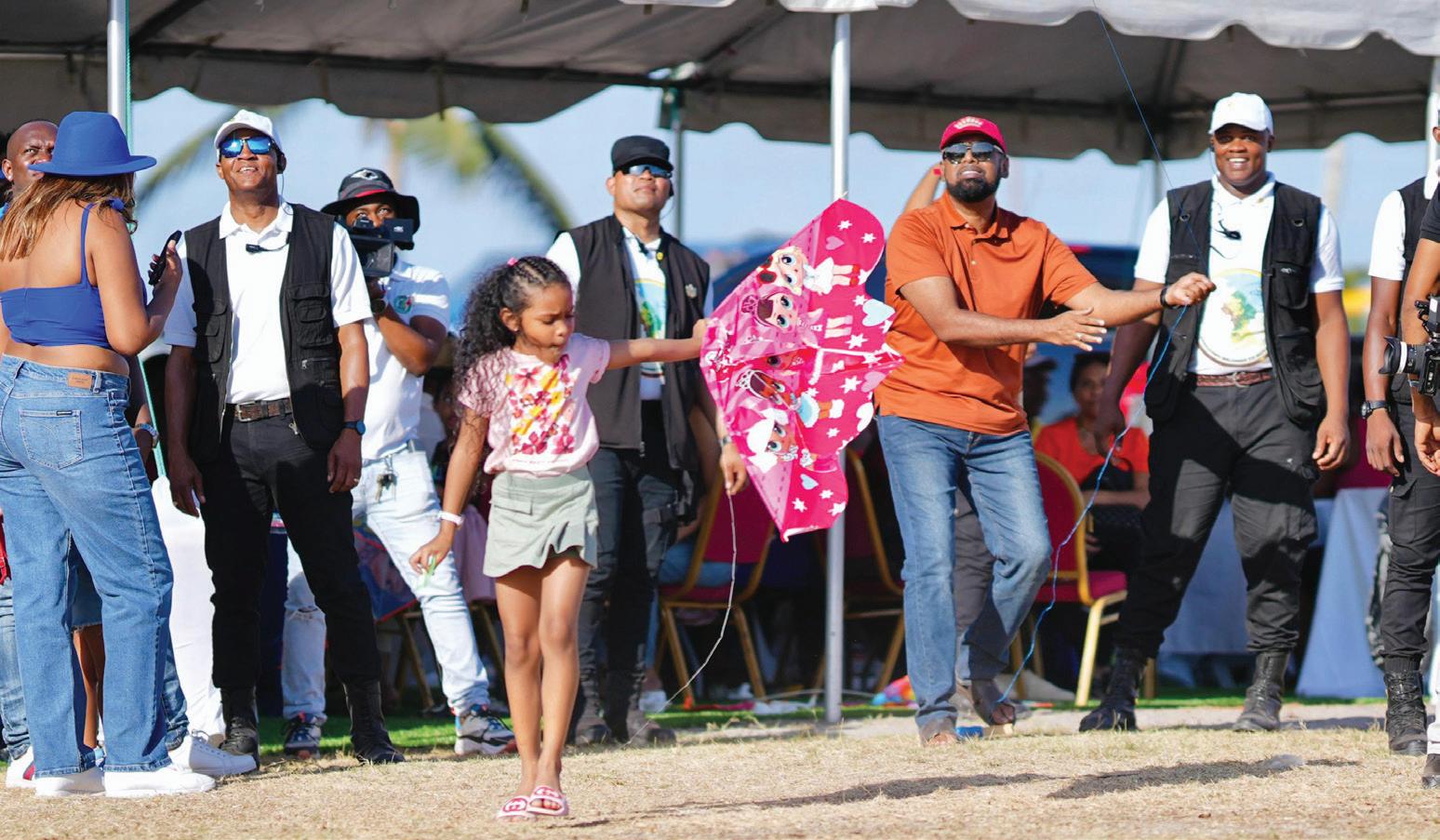
‘Nearly impossible that the region will ever produce another trailblazer as Justice Bernard’
—
Norton throws caution to the wind amid PNC’s internal struggles
—
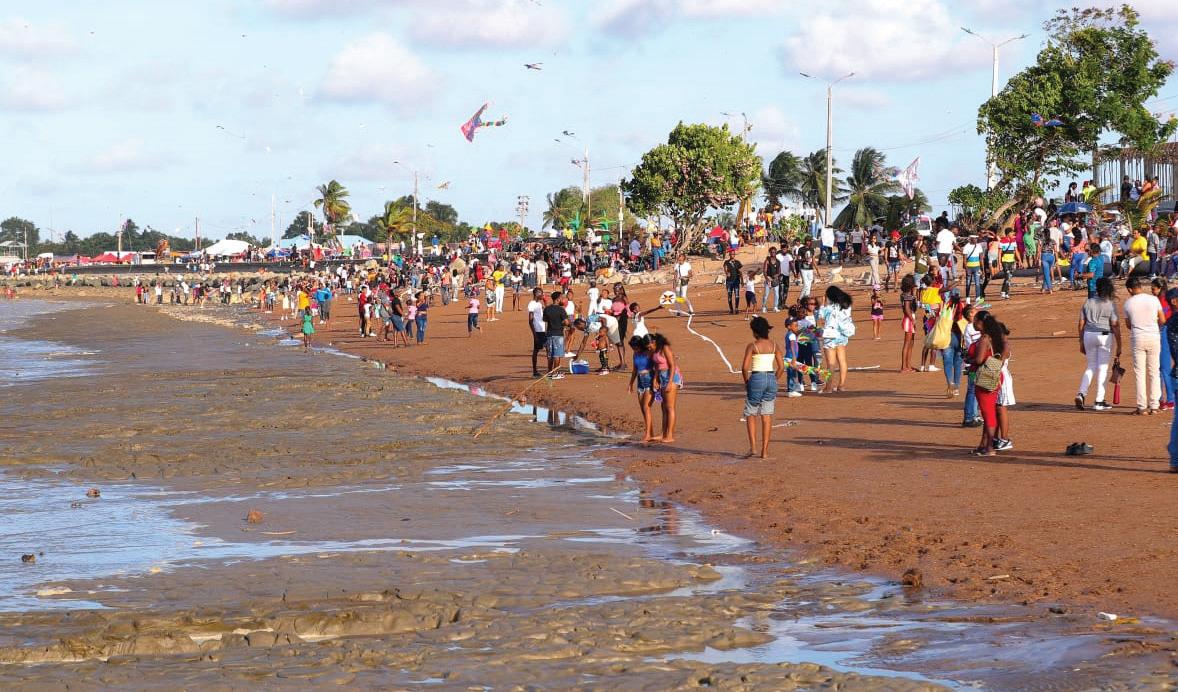
Arrival of military aircraft marks new chapter in India-Guyana relations
— Indian High Commission says
President Ali’s efforts to help Haiti ‘nothing short of monumental’ – Foreign Secretary
— US Secretary of State and Dr Ali engage in discussions to bring resolution


PRESIDENT Dr Irfaan
Ali’s recent interview with BBC's Stephen Sackur has garnered significant attention worldwide, as the Guyanese leader’s steadfast stance on climate change, environmental preservation, and his challenge to perceived Western hypocrisy has sparked a global conversation.
During the interview on BBC’s HARDtalk, Sackur questioned President Ali about whether Guyana’s focus on fossil-fuel extraction contradicts global efforts to combat climate change.
President Ali responded assertively, highlighting Guyana’s vast forest, which stores a significant amount of carbon, and its commitment to environmental stewardship.
“Let me stop you right there. Do you know that Guyana has a forest, forever[sic], that is the size of England and Scotland combined? A forest that stores 19.5 gigatons of carbon? A forest that we have kept alive?” he questioned.
Sackur further pressed President Ali on whether Guyana’s preservation of its vast forest, which stores a significant amount of carbon, justifies the decision to release carbon emissions through oil and gas extraction.
President Ali, in response, strategically flipped the script and put the question to the host: “Does that give you the right to lecture us on climate change?” adding: “I am going to lecture you on climate change.”
In challenging critics’ authority to criticise Guyana’s actions, President Ali highlighted Guyana’s environmental stewardship, which he said justifies its pursuit of oil and gas development, while maintaining a net-zero carbon footprint.
Sackur further questioned Guyana’s approach, referencing comments from Vice-President, Dr Bharrat Jagdeo expressing the urgency to extract oil amid the climate change imperative.
President Ali defended this stance as “practical” and “honest,” emphasising Guyana’s commitment to economic development and creating opportunities for its people.

He emphasised the country’s need to aggressively pursue its natural resources for economic growth and development, highlighting the lack of external support in bringing opportunities to Guyana.
“You can say we are rushing, but we are very practical. We have this natural resource. And we’re going to aggressively pursue this natural resource because we have to develop our country.
“We are committed to the development of this region. We have to create opportunities for our people because no one is bringing it out for us,” President Ali said.
Support for the Head of State’s stance poured in from around the world, with politicians, environmentalists, and advocates commending Guyana’s stance on its right to develop its resources responsibly while prioritising environmental sustainability.
According to the global voices, developing states like Guyana reserve their sovereign right to utilise their resources for economic development, recognising that responsible exploitation can uplift communities, improve infrastructure, and enhance living standards.
Guyana, rich in resources like oil, gas, and rainforests, has been developing this resource to address historical underdevelopment and vulnerabilities.
Former Colombian Minister José Manuel Restrepo Abondano took to ‘X’ (formerly known as Twitter), praising President Ali's re-

more harmful to the earth and atmosphere,” he said.
President Ali's advocacy extends beyond the interview room, with the country’s presidency of the United Nations Security Council in February highlighting the intersection of climate change, food insecurity, and conflict.
sponse, criticising Western hypocrisy on climate issues and advocating for responsible resource exploitation.
“Brilliant answer! This is the way in which biased questions are answered that hide a lot of global hypocrisy, especially from actors who are part of developed countries that do little about this issue at a global level and are experts in pontificating,” Abondano said.
Former Minister of Climate and the Environment of Norway, Erik Solheim, also lauded President Ali's defence of Guyana's rainforest, declaring: “The arrogance of the West is endless. The reply to BBC from Irfaan Ali, President of Guyana, is truly priceless. No nation has protected its wonderful forest like Guyana.”
Ben Ikari, a human rights and environmental justice advocate, commended President Ali's demonstration of knowledge and empowerment, stating: “Younger and vibrant President Mohamed Irfaan Ali of Guyana has demonstrated that knowledge is not only personal power but also empowerment for others and a designated tool for national, regional, continental, and otherwise defence.”
Theo Acheampong, an economist and political risk analyst from Ghana, echoed the sentiment, highlighting Guyana's right to exploit its resources for development while remaining committed to climate goals.
He said: “Guyana, like any other developing country, has the right to exploit its nat-
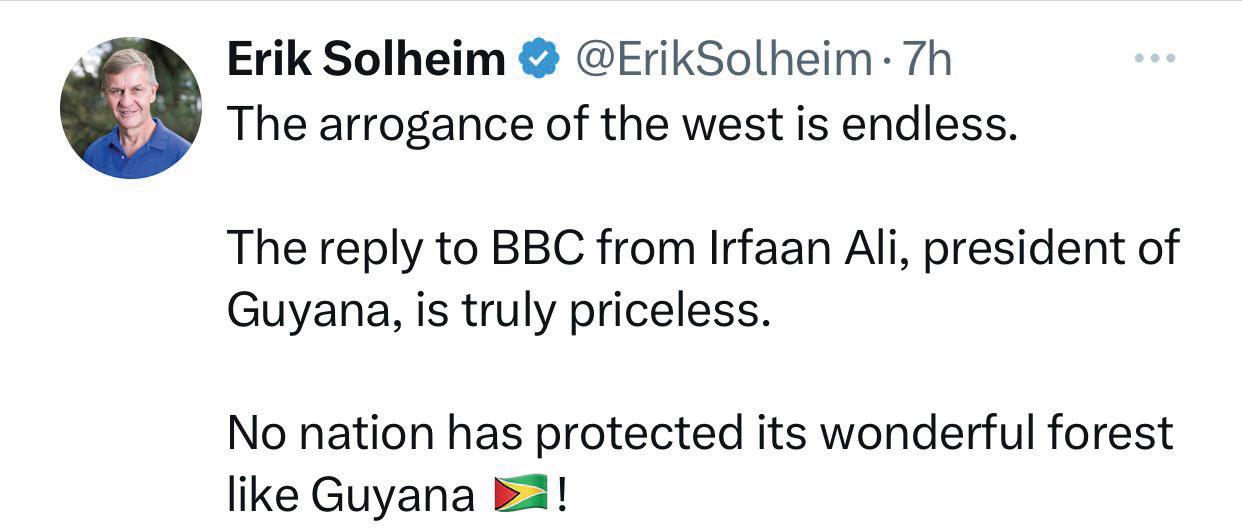
ural resources, including oil and gas, for its development while keeping to its climate goals as one of the world's remaining bio-sinks. There's no inconsistency in this.”
Energy economist Asas Alhajji highlighted the potential historical significance of Guyana's leadership in maintaining political stability and avoiding the resource curse while exploiting natural resources.
He remarked: “The leadership of Guyana will go into history books and economic literature if they can do two
things at once for the next 20 years: maintain political stability, avoid the resource curse.”
Furkan Gözükara from Türkiye criticised Western hypocrisy, pointing out the discrepancy in questioning Guyana's emissions while overlooking other environmental issues.
“I can't tolerate the shamelessness and hypocrisy of the western. They are asking Guyana about carbon emissions because they are going to extract their resources. Meanwhile, Israel's destruction on Gaza is 1000x
President Ali, who chaired a crucial engagement, shed light on the overlooked consequences of war on agriculture and poverty, underscoring the importance of holistic approaches to global challenges.
Guyana has garnered international acclaim for its steadfast commitment to environmental sustainability and proactive stance in combating climate change.
Acknowledged by figures such as US envoy Linda Thomas-Greenfield and the World Bank's Carlos Felipe Jaramillo, Guyana's dedication to environmental priorities, including support for rural communities and forest conservation, stands as a beacon of progress.
Initiatives like contributing to the Regional Adaptation Fund and establishing a state-of-the-art biodiversity centre underscore Guyana's resolve to balance economic growth with environmental preservation.
Moreover, Guyana's ambitious development plans, exemplified by its historic $1.146 trillion 2024 bud -
Continued on page 4

— US Secretary of State and Dr Ali engage in discussions to bring resolution
EVER since Haiti was plunged into a state of humanitarian and political crisis, President Dr Irfaan Ali, who also serves as Chair of the Caribbean Community (CARICOM), has worked assiduously to bring peace to the sister member state.
According to Foreign Secretary Robert Persaud, these continuous efforts and hard work by President Ali have been “nothing less than monumental.”
In a post on his Facebook page, Persaud said: “Every day and for many hours our President has engaged regional and global leaders as well as Haitian stakeholders to ensure a Haitian-led and executed solution.”
He added: “All Guyanese must be proud of the leadership and compassion being extended to the Haitian people.”
Moreover, United States’ Secretary of State Antony Blinken spoke with President Ali on Monday.
Secretary Blinken and President Ali discussed efforts to support Haiti’s Transitional Presidential Council and the Multinational Security Support Mission in Haiti.
Furthermore, Blinken has reiterated that the US values CARICOM’s support of Haitian efforts to promote inclusive and representative governance.
According to international news reports, heavily armed gangs attempted to take over Haiti’s main international airport, exchanging gunfire with police and soldiers in the most recent attack on important government locations in a wave of violence that also included a mass escape from the nation’s two largest prisons.

DESPITE glaring reports stating otherwise, Opposition Leader Aubrey Norton, while refuting the accusation that he governs the People’s National Congress-Reform (PNC-R) with an iron fist, blamed the opposition’s incoherence on some of his colleagues’ lack of institutional knowledge of the PNC-R and their personal ambitions over the party’s interests.
This is the case despite Norton, on several occasions, ruffling the feathers of his fellow opposition colleagues by making unilateral decisions on matters of importance, while leaving them in the dark.
During a press conference last Thursday, Norton was asked about the accusations of the opposition being incoherent and if it is true that he governs the PNC-R with an iron fist.
In response, Norton said that the opposition meets to discuss matters of national importance.
“We meet and discuss matters of national interest,” Norton said, noting that since he was elected as leader of the PNC-R, members have been “involved in discussions.”
The PNC-R Leader went on to accuse some members of the party of pursuing “ambition” over the party’s interests. This comes at a time when senior members of the party,
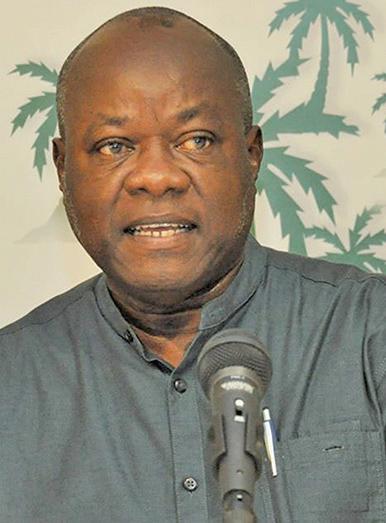
Roysdale Forde and Ganesh Mahipaul expressed an interest in contesting for the party’s leadership.
He said: “There are some persons in the party and I could show you recently, who make it their duty to create the impression that there isn’t [sic] discussions.”
The incumbent PNC-R leader then indirectly slammed a party member for some statements made on the Guyana-Venezuela controversy.
He said: “Yet one person who has no responsibility for foreign affairs goes out and make[sic] comments, and then the person with responsibility for foreign affairs, who consulted with me, went out and make [sic] comments; now there is not much you can do when ambition is more important than the party’s interests.”

indulgence and your guidance.
As he continued to deliver blows to this party members, Norton said that he does not believe the opposition’s incoherence is related to the hosting of meetings.
“And the other thing too is the absence of institutional knowledge. If you were not in the party over the years and these discussions were occurring, you would not have an idea of what is happening; and so you go and write in the era of social media looking for popularity,” he said.
Although Norton has placed the blame for the opposition having differing views at the feet of some members of the party, Norton’s leadership of the party has been heavily criticised both internally and externally from the inception of his tenure. As a result, this has led to several party members taking a step back in different ways.
For instance, in December, there were reports that Opposition Chief Whip Christopher Jones was taken aback after he found out that Norton had withdrawn an "urgent" parliamentary motion to address Venezuela's actions against Guyana.
Following Norton's address to the House, Jones interjected and asked the Speaker about the motion.
“Mr Speaker, I crave your
The APNU+AFC submitted a motion of urgent public importance last Friday. Could you guide us in terms of how we proceed with that motion, sir?” the Opposition Chief Whip questioned.
In response, the Speaker of the National Assembly, Manzoor Nadir said: “I discussed that with the Leader of the Opposition, and we had agreed that I will allow him to make a statement and that motion will not go forward.”
Unaware of the agreement between the Speaker and Norton, Jones appeared to have been caught off guard by Nadir’s response.
Moreover, this year, the Opposition Leader unilaterally rearranged the shadow cabinet, resulting in many of his colleagues being shocked by these major changes.
For example, A Partnership for National Unity + Alliance For Change (APNU) Member of Parliament (MP), Jermaine Figueira was stripped of his portfolio as Shadow Minister of Culture, Youth and Sport.
In an invited comment on Norton’s recent decision, Figueira told the Guyana Chronicle that he was initially “flabbergasted” by the decision, but has since accepted his fate.
From page 3
get, promise transformative changes to the country's economic landscape.
With major projects like the gas-to-energy initiative and the Amaila Falls Hydro Project underway, Guyana aims to achieve energy sustainability while reducing reliance on fossil fuels.
Investments in alternative energy sources align with the nation's goal of transitioning to 75 per cent renewable energy consumption by 2030, supporting inclusive growth and global sustainability objectives.
Additionally, Guyana is charting a course of regional leadership through initiatives such as the '25 by 25'
plan to reduce CARICOM's food-import bill and forging innovative financing models for environmental sustainability.
Economic forecasts predict unparalleled growth rates, with Guyana poised to experience a 38.2 per cent growth in 2024 and 15.2 per cent in 2025, the highest in the Caribbean.
However, amid these promising prospects, Guyana remains vigilant against the threats of climate change and environmental degradation, implementing comprehensive strategies and investing in renewable energy projects to secure a sustainable and prosperous future.
WITH innovation at its core, Guyana is poised to not only fulfil its ambition of becoming the “breadbasket” of the Caribbean but also pave the way for a new era of agricultural prosperity across the region.
This was according to the Minister within the Office of the Prime Minister of Guyana, Kwame McCoy, who was at the time explaining the imperative for a paradigm shift in attitude towards technology adoption, particularly among traditional farmers.
“The use of technology can essentially transform local agriculture systems in Guyana,” he said during a panel discussion at the 19th International Convention and Fair, Informática 2024, hosted in Havana, Cuba.
Guyana has been making bold strides towards reshaping the agricultural landscape of the Caribbean Community (CARICOM.)
It has emerged as a pivotal player, aiming to slash the region's food-import bill by 25 per cent by 2025.
Minister McCoy told the conference that not only is Guyana spearheading this ambitious plan, but leveraging cutting-edge Information and Communication Technologies (ICTs) to revolutionise its agricultural sector.
He stressed that agriculture, inherently dynamic and data-driven, demands real-time information for informed decision-making.
Minister McCoy, as such, emphasised the pivotal role of digital technologies in providing farmers with crucial data and insights.
“Access to information

is crucial in decision-making for viable and sustainable agricultural business,” he affirmed.
According to Minister McCoy, Guyana's Agricultural Technology (AgTech) initiatives stand as a testament to its commitment to harnessing ICTs for agricultural advancement.
Additionally, investments by the Guyana Sugar Corporation (GuySuCo) in drones equipped with multi-spectrum cameras and sophisticated software promise to revolutionise chemical application, leading to increased sugar recoveries and productivity while curbing costs.
Guyana is also forging ahead with the development of a rice production monitoring system, aimed at digitising rice lands to enhance data collection and analysis.
Minister McCoy pointed out that this initiative is anticipated to bolster efficiency and reliability in monitoring crucial production field data, including sowing, harvesting, yield,

and loss.
The National Drainage and Irrigation Authority (NDIA) is set to integrate geospatial technology into their data collection and monitoring processes, facilitating precise monitoring of crop and livestock practices, soil health, and irrigation patterns.
This strategic integration, the minister said, is poised to optimise agricultural practices and resource management.
Additionally, Guyana's commitment to agricultural innovation is underscored by the establishment of a state-of-the-art biotechnology laboratory at the National Agricultural Research and Extension Institute (NAREI).
This facility will serve as a hub for crop improvement initiatives, fostering enhanced crop diversity and resilience in the face
of evolving agricultural challenges.
This year, the government has budgeted approximately GY$97.6 billion for agriculture for investments in drainage, irrigation, flood management, and supporting different sub-sectors like sugar, rice, coconut, and other high-value crops.
Additionally, there are substantial funds allocated for agro-processing, poultry, aquaculture, and fisheries, indicating a comprehensive approach to agricultural development
The budget also highlights the government's commitment to improving infrastructure, with substantial investments in roads, bridges, and community roadworks to facilitate agricultural activities and enhance connectivity across the country.


CRUDE oil futures rose in the first day of second quarter trading Monday, adding to commodity’s streak of gains this year.
The West Texas Intermediate contract for May delivery gained 98 cents, or 1.18 per cent, to $84.15 a barrel. The Brent contract for June delivery added 68 cents, or 0.78 per cent, to $87.68 a barrel.
US crude and Brent have booked three consecutive months of gains. WTI is up 17.6 per cent for the year while Brent has risen 13.9 per cent.
Oil has been grinding higher in 2024 on expectations of strong global demand as OPEC+ holds barrels off the market through at least the second quarter.
Geopolitical risk also remains present in the market as Ukraine strikes Russian oil refineries, and Houthi militant attacks in the Red Sea have led to the diversion of crude deliveries around the Cape of Good Hope in southern Africa. (CNBC)


IN the global conversation surrounding climate change and the pursuit of sustainable development, the case of Guyana presents a fascinating intersection of environmental responsibility and economic opportunity.
Vice-President Bharrat Jagdeo has articulated a compelling argument for the nation's approach to utilising its natural resources, particularly oil, while maintaining its status as a carbon sink nation.
Critics may question whether Guyana's focus on fossil fuel extraction contradicts global efforts to combat climate change.
However, Dr. Jagdeo adeptly counters these concerns by highlighting Guyana's unique position as a carbon sink nation with over 87 per cent of its land covered by forest.
This vast expanse of forest not only serves as a critical habitat for biodiversity but also plays a crucial role in sequestering carbon from the atmosphere.
The Vice-President rightly emphasises the significance of Guyana's forest in mitigating carbon emissions. Even at maximum oil production, which is projected to reach 1.5 million barrels per year, Guyana will continue to
function as a carbon sink.
Dr. Jagdeo's assertion is supported by scientific data, which indicates that Guyana's forest stores approximately 19.5 gigatonnes of carbon, with a remarkably low deforestation rate.
Guyana's commitment to climate security is commendable. The government's decision to invest millions earned from the sale of forest carbon credits into climate-proofing initiatives demonstrates a proactive approach to addressing the challenges posed by climate change.
These investments not only benefit Guyana but
also contribute to global efforts to combat climate change.
Moreover, Guyana's Low Carbon Development Strategy (LCDS) 2030 reflects a forward-thinking approach to balancing economic development with environmental sustainability.
By monetising the climate and ecosystem services provided by its standing forest, Guyana aims to accelerate economic growth along a low-carbon trajectory.
Dr. Jagdeo's critique of the disproportionate burden placed on developing nations like Guyana is both
valid and timely.
He rightly questions the moral obligation of the developed world in addressing climate change, given that the current concentration of greenhouse gases is largely attributable to their historical emissions.
Guyana's contribution to global emissions is minuscule compared to that of developed nations, yet it is expected to bear a significant responsibility.
Furthermore, Guyana's commitment to transparent and accountable resource management sets a commendable example for the international community.
The government's
amendment of the Natural Resource Fund Act to ensure parliamentary oversight of oil revenue demonstrates a commitment to responsible governance and stewardship of resources.
Guyana's approach to balancing oil extraction with environmental preservation is a model worth emulating. As the global community continues to grapple with the challenges of climate change, Guyana stands as a beacon of responsible resource management and environmental stewardship.

Dear Editor,
I AM amazed at the progress made to restore Guyana’s economy and, more so, the agriculture sector over the last three to four years. The government under the leadership of President Ali has done a tremendous job and their efforts should be applauded. They have indeed worked for the people.
As I mentioned before, the agriculture sector has seen tremendous growth under this administration.
When the President appointed Minister Musta -
pha to guide the sector, he made an excellent decision. Minister Mustapha is undoubtedly one of the most active Cabinet Ministers and has proven himself to be the man for the job as he is always on the ground engaging the people and making interventions to further develop the sector.
There is so much to be said for Guyana’s agriculture sector. So many things have been accomplished in such a short period. So many of the commitments that were made to the people while the government was in opposition have

been delivered, and despite global challenges, the sector continues to prove itself resilient.
When the government got into office in 2020, it made good on the commitment to reverse the imposed increases on land rentals within the MMA Scheme. This is the largest agricultural scheme in the country, so just imagine the impact that this intervention has had on the farmers in that area. Rice production has also seen tremendous improvements. More lands are being planted, higher yields are recorded, more
markets are being secured, and farmers are now benefitting from additional support to complement their production.
The ministry’s GRDB has also launched two new varieties in the last three years, demonstrating the government’s commitment to research and development to boost this industry.
The sugar industry, after being starved of government support for five years under the previous administration, is also seeing improvements. The reopening of the Rose Hall estate was a testament to the government’s commit-
ment to the people of this country and the development of such an important industry.
The livestock industry has also seen its fair share of development. New breeds of animals are being introduced for cattle, small ruminants, and poultry. Production is increasing as farmers are now benefitting from artificial insemination and embryo transplant services.
Additionally, efforts are also being made to produce the inputs necessary to produce feed to support this sector. With the large-scale cultivation of
corn and soya beans being undertaken in the Tacama Savannah, Guyana is well on its way to becoming self-sufficient in producing feed for the livestock sector by the end of 2025.
Another milestone for the sector is the rapid increase in the use of climate-smart agricultural techniques. To date, the ministry has been able to facilitate the construction of approximately 400 shade houses across the country. Women and youth are also playing a greater role in these initiatives as the President has man -

Dear Editor,
IN my journey through the world of development and fundraising, I've been starkly confronted with the profound disparities in global responses to crises. From the overlooked tragedy in Tigray, where hundreds of thousands have suffered, to the contrasting extensive support for Ukraine, the imbalance is glaring.
The silent echoes of forgotten wars, like those in Tigray, against the backdrop of the mobilised aid for Ukraine, reveal a selective global attention that is deeply troubling. This tale of two crises—one spotlighted, the other shadowed—underscores a critical gap in our collective empathy and support.
As the tensions between
Guyana and Venezuela highlight the urgent need for diplomacy, it's clear we must reimagine our approach to crisis response, championing a cause that brings forgotten crises into the global spotlight, ensuring equity, compassion, and actionable support for all communities in distress.
The war with Ukraine started in February 2022, and it has torn apart countless lives. The world hasn't stood by idly; instead, Ukraine has received an incredible $278 billion in help from across the globe, showing just how much people can pull together in response to tragedy. But there's another story not getting the same spotlight— Tigray's ordeal, which started back in November 2020.
The scale of suffering is shocking, with deaths potentially reaching up to 600,000 due to the fighting,
lack of food, and disease. But Tigray's call for help often goes unnoticed, $2 billion in aid, starkly highlighted, showcasing a profound imbalance in global compassion and assistance.
This is a strong wake-up call that we must improve how we listen and offer support to every place facing trouble.
The glaring gap in global aid and attention casts a spotlight on the simmering tensions between Guyana and Venezuela, spurred by Venezuela's aggressive territorial claims. Under the intelligent leadership of President Irfaan Ali and Vice President Bharrat Jagdeo, Guyana is pursuing peace, choosing the path of diplomacy and dialogue over conflict, in stark contrast to President Maduro's confrontational approach.
Faced with Venezuela's looming threat, Guyana's
limited military means underscores not just the challenges of small nations navigating global politics but also the critical necessity for a more balanced, human-centered approach to supporting all nations in crisis.
The crises in Ukraine, Tigray, and the tensions between Guyana and Venezuela reveal a stark truth: Not every crisis receives the attention and aid it needs, unveiling a world where support is unevenly distributed, often swayed by geopolitical interests, media spotlight, and deep-seated biases.
This reality demands a re-evaluation of our approach to global aid, advocating for a system where assistance is based purely on humanitarian need rather than visibility or political considerations.
Embracing diplomacy, dialogue, and mediation as tools for peace, the interna-
tional community must commit to treating every affected individual not as a statistic, but as a person with hopes and dreams.
By getting involved in teaching others, standing up for what is right, and offering direct help, we're all pushing for a fairer way to share support and kindness. Imagine a world where everyone counts, no matter where they're from, what they look like, or where they live—a big leap forward in solving our problems together, with kindness and caring for each other above everything else.
The world's on fire right now, from Ukraine to Tigray and that whole mess between Guyana and Venezuela. It seems like how much help a place gets depends on where it is, which just isn't right. We need to start focusing on people, all people, no matter what's going on.
It’s a call to the global community to reassess and realign our response strategies, ensuring aid and attention reach those most in need based on their suffering, not their strategic importance or media visibility.
This collective effort to shine a light on overlooked crises and champion the cause of peace and stability is not just a matter of policy but of moral imperative. By fostering a world where empathy and action are driven by the needs of the afflicted, where diplomacy and dialogue prevail, we inch closer to a future where every individual, regardless of where they are, feels valued and supported in their hour of need.
Respectfully,
Haimdat SawhFrom page 6
dated that all agricultural initiatives must comprise no less than 35per cent of women and youths.
Many of these youths are now involved in the cultivation of high-value crops such as bell peppers, carrots, broccoli, and cauliflower under the Agriculture and Innovation Entrepreneurship Programme (AIEP). Guyana is also home to the largest hydroponics farm in the Caribbean with the capacity to produce 100,000 heads of leafy vegetables like lettuce, pakchoi, basil, kale, rocket, and mustard.
This project will soon be replicated in Regions Two, Five, and 10. Last December, the President himself turned the sod for the commencement of the Region Two project at the GSA Campus.
The fisheries sector has also seen massive development and improvements in production. In particular, brackish water shrimp pro-
duction, having increased by just about 600 per cent, speaks volumes. The ministry has now embarked on the production of prawns, an industry that promises great financial benefits to all the farmers who will be involved.
Cage culture was also introduced to boost the village economies of Indigenous villages. Villagers are already harvesting Tambaqui, a species considered a delicacy that attracts quite a substantial market price.
Guyana has stepped up to play that lead role in CARICOM, paving the way for regional food and nutrition security. Our Minister is also cheering the Ministerial Taskforce set up by CARICOM to guide the implementation of policies geared towards lowering the regional food import bill by 25 per cent by the end of 2025.
There is no doubt that we are being recognised for our agricultural pursuits and accomplish -
ments. Only recently Guyana hosted the 38th FAO Regional Conference. Never in Guyana’s history have we been afforded such a prestigious honour. Minister Mustapha was also elected to serve as Chair for the Conference’s proceedings and special meetings for the next two.
This is another astonishing accomplishment for Guyana. The government was also able to host two successful Regional Agriculture Forum and Expos.
I said all that to say this, Guyana’s agriculture sector is on the right track. New investments are being made to boost the sector, farmers are getting the support of central government, and production levels are at an all-time high. If we continue along these lines, we will be able to once again become the food basket of the Caribbean.
Yours truly,

MY wife and I decided for Easter Monday, we will have Gilbaka curry. On Easter Sunday, after exercising in the National Park, I went to the Bourda Market fish pond to buy the stuff. The gate was closed. The folks selling outside told me on Sundays and holidays the market closes at 10:00hrs.
I looked at my phone time and it was 09:50hrs. So how could they shut off before 10:00 hrs? I still got the stuff because a gentleman outside asked me what I wanted. He then yelled out, “Beryl, Beryl, Freddie Kissoon want
Gilbaka.”
Beryl handed me the stuff over the gate. I should not have been surprised because after living all my life in Guyana, I know you don’t see the eerie things in other countries that you see here. I think the US is the most extremely eerie country on Planet Earth but Guyana is an oddball. But I was indeed surprised.
Why would a market, municipal or otherwise, close at 10:00hrs on a holiday? On Sundays and holidays, it is the best opportunity for working people to shop. Billions of people work from Monday to Saturday from 08:30hrs

to 16:30hrs. When they get home, they are tired plus they want to see their kids at home. Sunday is the best opportunity to shop.
Why would the authorities close the market at 10:00hrs? This is the time you go out to shop. What is the reason for 10:00hrs
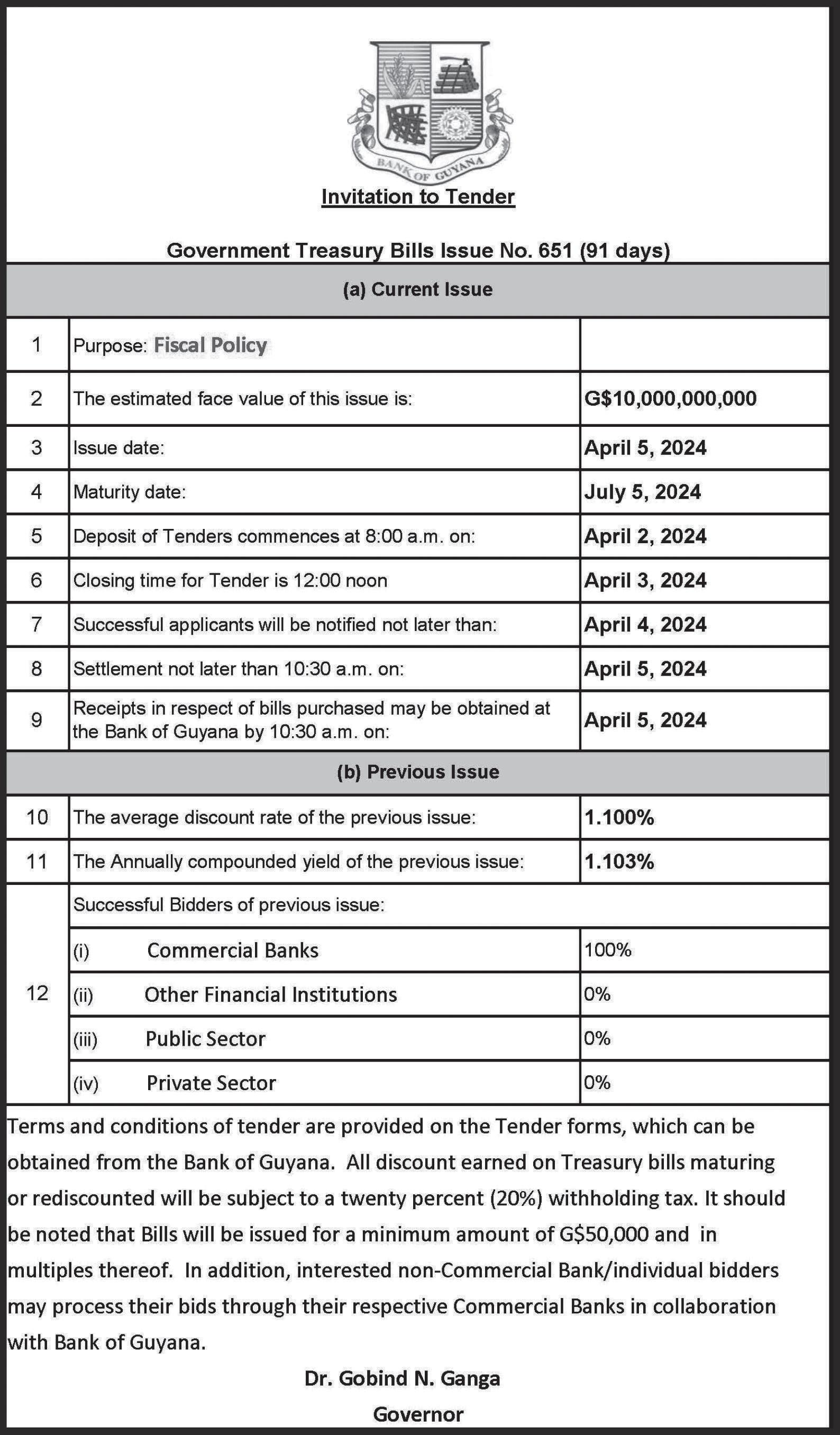
and not 14:00hrs? To think that is the 21st century, a market closes at 10:00hrs is incredible. I still cannot fathom why so early in the morning but of course, I know the answer – it was like this 100 years ago.
Do you know how many regulations that are absolutely irrelevant in the 21st century, we inherited from the British that we still live with here in Guyana? Do you know in a column career going on to 36 years how many times I have pointed out the abominable irrelevancies that no one wants to get rid of and that should have been eradicated since the year of Independence in 1966?
The 10am market thing has its origin in colonial times. When the man shouted Beryl, Beryl, there were about another 10 persons outside the gate waiting to buy meat and fish like I did. Commonsense should tell the people at City Hall that you do not close a market at 10:00hrs on perhaps the days when working people have to shop – Sundays and holidays.
Guyana has always been the West Indian polity that had a more progressive world outlook. Even to this day, we have still maintained that tradition. Take two examples – we have a more open mind about homosexuality and are far ahead of CARICOM countries in support of stopping genocide in Gaza. So you wonder why these ancient oddities are still with us.
Do you know there wasn’t any publicity given to something positive Trinidad did recently? Trinidad has removed all regulations that prevented men and women from entering a public building wearing sleeveless tops and other similar accoutrement? Just think of it, in a tropical climate, citizens cannot wear sleeveless tops. That is equivalent to a café in Siberia saying, “no winter jackets allowed.”
There is a silly policy at the Guyana Revenue Authority that has to be removed. I went in October 2019 to collect my car on the wharf. The GRA office was on lunch. You have a country where vehicles
are coming in on a daily basis and customs officials are kept busy yet all work ceases when it is midday. Commonsense should tell you to have a rotation system whereby the lunch break is staggered and customers are served during the lunch period. This is commonsense man, you don’t need university training to know this.
Do you think despite 35 years of advocacy in these columns, these regulations will be a thing of the past? My answer is no. I have been doing these columns for 35 years and several times long before 2019, I mentioned the GRA work anomaly yet I encountered it in 2019.
Guyana defies commonsense and philosophy.
In Guyana, for the court to grant you a divorce, you must cite one of three reasons – infidelity or malicious desertion or domestic abuse. But there must be several other reasons other than those three.
So why can’t you cite the philosophical reason of people moving on through mutual consent. In fairness to her, Minister Manickchand when she first became a minister drafted no-fault divorce legislation. It never reached the parliament.
On Easter Monday, I did have my Gilbaka curry despite some ancient regulations in Guyana in the 21st century.


A NEW chapter in India-Guyana cooperation began, as an Indian Air Force (IAF) team arrived in Guyana to deliver two HAL-228-201 aircraft manufactured by Hindustan Aeronautics Ltd. (HAL).
According to the Indian High Commission, the aircraft are being provided under a Line of Credit (LOC) extended by India to Guyana for which an agreement was signed on March 15 2024.
High Commissioner of India to Guyana, Dr Amit Telang, underscored the unique relationship between India and Guyana as he interacted with IAF and HAL officials.
The aircraft to be operated by the Guyana Defence Force (GDF) will also provide connectivity to remote areas and can be used for wide range of functions including medical evacuation, disaster response, among other things.

To bolster the capabilities of the GDF, Senior Minister in the Office of the President with Responsibility for Finance and the Public Service, Dr. Ashni K. Singh, on behalf of the Government of Guyana, had signed the LOC Agreement of US$23.27 million, with the Export-Import Bank of India (EXIM Bank), for the procurement of the two aircraft.
Dr. Singh, while delivering remarks, placed on
record the government’s great appreciation of India’s unwavering support to Guyana, and alluded to the two countries’ long-standing relationship grounded in history, people, and culture, and, in more recent times, economic and commercial cooperation, the release added.
The Finance Minister said too: “We want to see more Indian companies doing business in Guyana. We are open to companies from
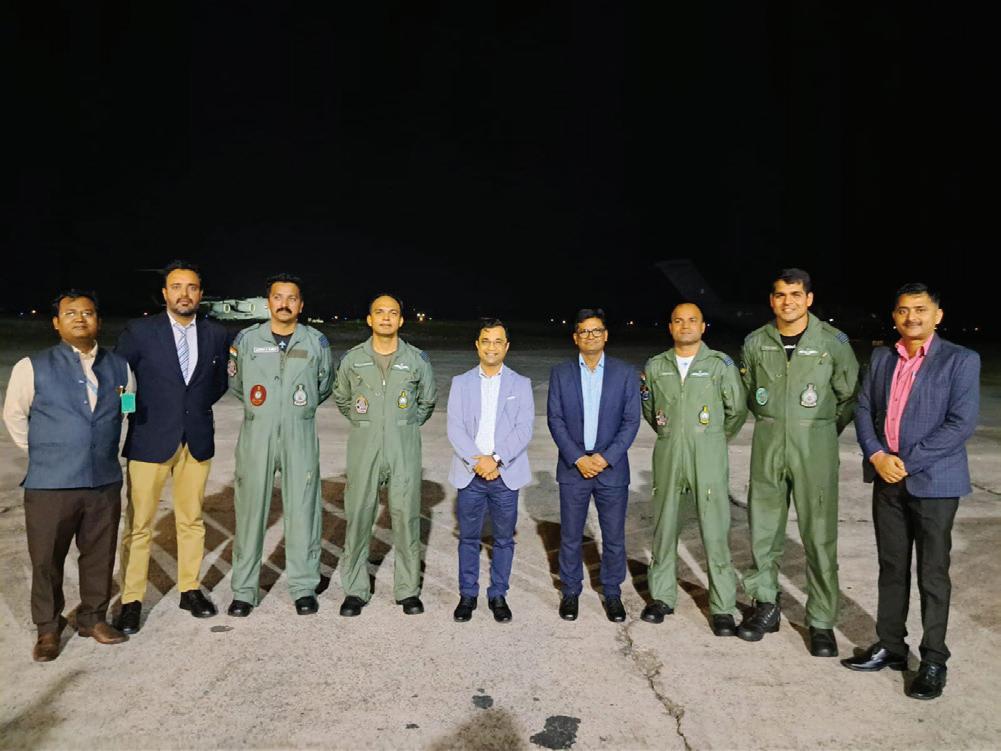
around the world, including of course India, and India is amongst the economies that are at the cutting edge of technology, and we want to receive the benefit of that cutting edge technology.”
In reiterating the government’s commitment to bolstering the country’s security sector, he had related that the government was investing heavily in strengthening the capabilities of the GDF, in particular, in some of its specialised wings, such as
the Air Corps and the Coast Guard.
He further said that the purchase of the two aircraft was part of the biggest ever investment in the capitalisation of the force thus far.
Guyana and India established diplomatic relations on May 26, 1966, and continue to have a robust developmental cooperation programme aimed towards the mutual benefit of both countries.

THIS past week President Dr. Irfaan Ali grew in stature in my eyes. I have a higher level of admiration for him for the way he handled himself during the BBC Hard Talk programme that was seen around the globe.
He was crisp, appropriate, and insightful and pointed in his response. He is fearless, apt to learn and is giving a good account of himself on the international stage.
I was discussing the interview with my wife and she said she did not like that
at points he came over as angry and argumentative. I defended him fiercely.
I felt he had a right to display indignation to the fact that Stephen Sackur’s line of questions suggested that we turn off the fossil fuel wells and pursue a path of development without oil, in the name of saving the environment, a marque policy pursuit of the world’s most developed nations.
I do not need to regurgitate Dr. Ali’s answers. His words need no further clarity. If you missed the interview, it’s all over You-
Tube and other social media platforms, go take a look, in fact, it is somewhat viral. That said, I would like to dig in a bit on the conceptualisation of the indignant response from the president.
Allow me to quickly hark back to the period of the cold war which was essentially a war of political and economic ideology. The West saw political and economic developmental trajectory in binary terms, you are either for or against a particular ideology.
Continued on page 10

The following is the full text of a statement from the Caribbean Court of Justice on the passing of retired CCJ Judge, Mme Justice Désirée Bernard:
“THE Caribbean Court of Justice (CCJ) regretfully advises of the passing of retired CCJ Judge, Mme Justice Désirée Bernard.
Mme Justice Bernard was a member of the inaugural CCJ Bench in 2005 and she provided exemplary service to the Court until her retirement in 2014.
A citizen of Guyana, Mme Justice Désirée Bernard established a number of professional “firsts”: first female High Court Judge of the Supreme Court of Guyana (1980); first female Justice of Appeal (1992); first female Chief Justice of Guyana and in the Commonwealth Caribbean (1996); and first female Chancellor of the Judiciary of Guyana and in the Commonwealth Caribbean (2001).
During her long and distinguished career, Mme Justice Bernard held memberships in various regional and international organisations, having been the founding Secretary of the Caribbean Women’s Association (19701974); first President of the Organisation of Commonwealth Caribbean Bar Associations (OCCBA, 1976); member and Chair of the Caribbean Steering Committee for Women’s Affairs, later established as the Women & Development Unit of the University of the West Indies (1978).
Internationally, Mme Justice Bernard served as both rapporteur (1982-1984) and Chair (1985-1989) of the United Nations Committee on the Elimination of Discrimination against Women during her membership, which ran from 1982 to 1998.
Mme Justice Bernard presented many scholarly papers and participated in numerous
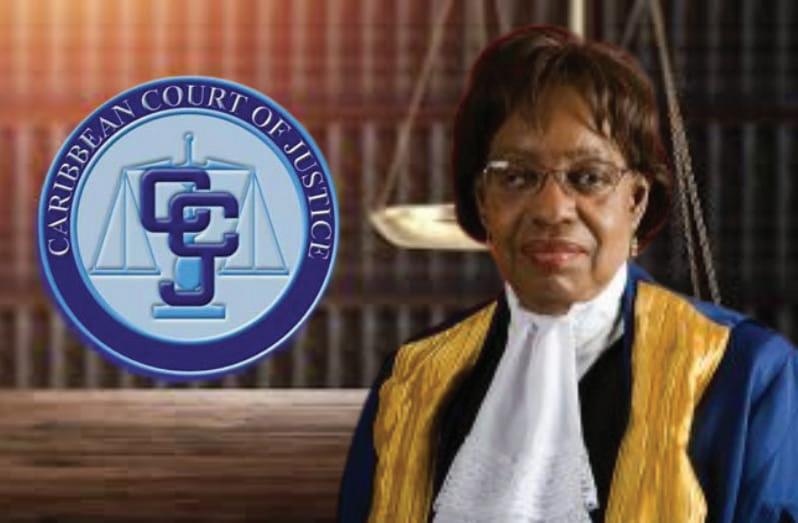
international seminars and colloquia both regionally and internationally on a variety of subjects relating to the law, gender, and other matters of public interest.
Mme Justice Bernard took the oath of office as a Judge of the Caribbean Court of Justice on April 16, 2005.
CCJ President, the Hon. Mr Justice Adrian Saunders observed that “it is well-nigh impossible that the region will ever produce another trailblazer as Justice Bernard
was. She was a tremendous role model and while it is tempting to focus on her contribution in inspiring generations of women regionally and internationally, her influence in the region generally, in the creation of the OCCBA and in the development of our Caribbean jurisprudence, must not be forgotten. It was an absolute privilege and pleasure to work alongside her.”
As the first female jurist on the CCJ Bench, Justice
Bernard also was a source of inspiration to others in the judicial fraternity. The Hon. Mme Justice Maureen Rajnauth-Lee was one such mentee. She reminisces “Justice Bernard was a great friend, mentor, mother, and sister to all. She was the first Patron of the Caribbean Association of Women Judges. We stand on her shoulders. What amazed me most about Justice Bernard was that she was so self-effacing. She just couldn't understand why we thought so much of her. Kindness and humility were her virtues. May she rest in peace, and may her memory be a blessing.”
For her exceptional contribution to the improvement of the status of women and to the development and practice of law, Mme Justice Bernard received several awards, the most notable being the Cacique Crown of Honour, and the Order of Roraima,
Guyana’s third and second highest national awards, respectively. In July 2005, she was awarded the CARICOM Triennial Award for Women. She was awarded the degree of Doctor of Laws (honoris causa) by The University of the West Indies in November 2007. In February 2011, Mme Justice Bernard was appointed a judge of the Inter-American Development Bank Administrative Tribunal. In February 2023, the University of Guyana visited in person to confer on her an honorary Doctor of Letters in Trinidad and Tobago where she resided.
The Court will open a condolence book to the public on Monday, April 8, 2024 in recognition of Justice Bernard’s sterling contributions. We salute this pioneering jurist and mourn the loss with her family and friends. May she rest in peace.”

From page 9
Some nations took clear cut sides, but many others questioned why they cannot borrow positive attributes from both of the dominant prevailing ideologies. Thus, the Non-Aligned Movement was born. The Western ideology was reinforced via the Bretton Woods Monetary system which was pursued by a group of countries under the moniker Allied Nations.
That system ended to benefit the USA and its own economic and foreign policy, giving birth to the International Monetary Fund (IMF) which took greater prominence during the period of the thawing of the cold war, sometime around 1984 to 1991.
Elements of Bretton Woods, which ensured that the US dollar was the dominant currency of world commerce, helped to impoverish many countries whose politico-economic system were not created in the image of the West.
Even many non-aligned
countries subscribed to the Structural Adjustment Programmes of the IMF due to crushing economic downturn. This meant that the West dictated the path to development for great many nations in every corner of the world. This path to development often included many unsuitable economic prescriptions tailor made in the developed West and enforced as “a conditionality” in the Third World.
Ha-Joon Chang a South Korean economist in his 2003 path breaking book was forthright, if not indignant, that the same policies that brought economic success to First World nations including state intervention and control, are the very ones developed countries have pressured their developing counterparts to avoid in the name of political and economic freedom.
Chang was adamant that developing countries do not need to photocopy the development policies, institutions and political systems of the West in order to pursue prosperity. He argued that
the West is actually stifling Third World economic prospects by “Kicking Away the Ladder” of development.
In that Hard Talk interview, Dr. Ali’s indignation was justified, his passion could be felt. Nobody in England, America or anywhere else in the developed world should lecture us on how to exploit our national patrimony for the economic prosperity of our people when their own record is sordid.
In fact, we have already demonstrated that we are ten times more responsible, because we are keeping our forest standing with the world’s lowest levels of deforestation coupled with the implementation of other carbon negative initiatives to offset any pollutions from hydrocarbon exploitation.
I am happy we have leaders who understand that our ladder is being kicked and nudged to try to derail our climb and are prepared to fiercely protect our path to prosperity. We must! We can! We will!

PEOPLE’S Progressive Party (PPP) General Secretary, Dr Bharrat Jagdeo, has firmly said that the Government of Guyana is taking the recent spurious claims emanating from the Bolivarian Republic of Venezuela very seriously.
He said this during a press conference last Thursday at the party’s headquarters.
“We are taking it seriously and that is why the Foreign Ministry put out a statement and you’d see from the statement that the Government of
Guyana is treating this as a serious matter.
“So it could be a distraction from its domestic issues... but any threat to our sovereignty is taken seriously by the Government of Guyana,” Dr Jagdeo said.
The Ministry of Foreign Affairs and International Co-operation, in a press statement, said: “The Government of the Cooperative Republic of Guyana is gravely concerned over the adoption of a law by the Venezuelan National Assembly declaring the


Essequibo region of Guyana, which constitutes more than two thirds of its national territory, to be a constituent part of Venezuela.
“This is in flagrant violation of Guyana’s sovereignty and territorial integrity and is in breach of the fundamental principles of international law enshrined in the United Nations Charter. It is also
an egregious violation of the Order on provisional measures issued by the international Court of Justice on December 1, 2023, and it is a violation of the Argyle Declaration of December 14, 2023, agreed to by the leaders of CARICOM and Brazil, the representative of the United Nations Secretary-General and by the Presidents of Guy-
ana and Venezuela.
“Guyana remains committed to peace on its borders and in the region. It will not allow its sovereignty and territorial territory to be usurped. Guyana will exert all of its efforts under international law to ensure that its sovereignty and territorial integrity remain intact.
“Guyana calls on the
international community to uphold the rule of law by rejecting Venezuela’s illegal expansionism and by insisting that Venezuela revert to the International Court of Justice, which has before it the case for a full and final resolution of the controversy over the land border between the two countries.”

IN a scenic display of colourful kites in all shapes and sizes upon the blue sunny sky, a noticeable buzz of excitement filled the atmosphere as a diverse range of Guyanese flocked to various recreational facilities across Guyana to celebrate the resurrection of the Lord Jesus Christ and spend time with their family and friends.
Reflecting on the past when there would usually be various “hot spots” like the Kingston Seawall, the Botanical Gardens in Georgetown for picnics and beaches across the country, 53-yearold Theresa Ignatius told the Guyana Chronicle there are now many options due to the development of the many play parks and safe spaces for families.
"Listen, for years, me and my family used to make sure we went to the gardens and the seawall very early to make sure we got a space to relax for the day, but now we have many options, and families have many other options, thanks to President Ali and his government.
“Today we packed our food and loaded up the vehicle, and I let the children and grands know if we couldn’t find a space at the gardens or the seawall, we were going to the Industry Seawall or by the Boulevard in Albouystown. I really love that we have choices, and this is what I am seeing all over Guyana,” Ms. Ignatius said.
While wishing the President and all of Guyana a Happy Easter, Ms. Ignatius said: “I travelled and spent time overseas before, but I can tell you, we as Guyanese might have differences, but there is no place else in the world


where you can see Muslims, Hindus, and Christians come together and celebrate like Guyana.
“We don’t look at hair and colour to eat and drink from, and we definitely have a President that celebrates and enjoys with all of us. So, I want to wish all Guyanese, including our President and his government, a happy Easter, and I hope that we can live every day as we do on these holidays, with togetherness.”
Also speaking with the Guyana Chronicle was Jay Nandkishun, an overseas
based Guyanese who recently spent his Christmas holiday in the country and came back for the Phagwah and Easter festivals.
According to him: “Even though I am living overseas, I always wanted to come back home during these holidays and, in a sense, relive my childhood days. The good old days of just having a good time with family, friends, neighbours, and just the villagers in general. I cannot tell you when last I spent a holiday in Guyana, but seeing the development of your country, the growth of the economy,
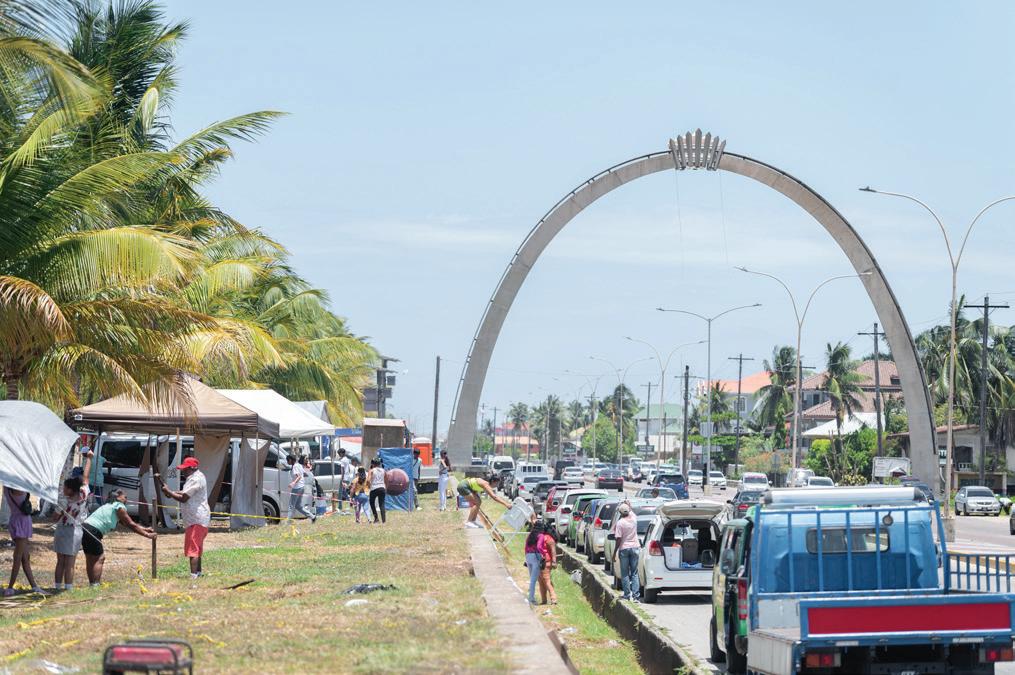

and how far we have come as a nation and a people, the excitement of coming home is one that I looked forward to when I came for Christmas, and that experience caused me to plan this trip for Phagwah and Easter.
“It is nice to see that we can get back to our roots and genuinely enjoy the way we are, put aside our differences, and just engage, interact, and be safe amongst ourselves. It is times like these that we truly see that Guyana is a melting pot of diverse cultures, and for sure that we are one people, in One Guyana.”
Finally, Mr. Nandkishun extended his gratitude to President Ali and his government for “creating an environment that is safe, secure, and fun for all to enjoy.”
He said: “The level of security that I’ve seen all around Georgetown, and along the coast, says a lot about the interest that is being paid to the people and their welfare, and I hope that we can all stay safe, look out for each other long after the season is over, and let us live in love and unity.”
Meanwhile, in his Eas -
ter message to Guyanese, President Ali said in part, “I am pleased to extend Easter greetings to all Guyanese, but especially to our Christian community, for whom this is the most joyous season in their liturgical calendar.
“Easter is central to the Christian faith. The story of Easter celebrates Christ’s Resurrection, heralding a time of profound significance for the Christian community. Easter resonates with the promise of redemption and the triumph of love over sin and death.”
He continued, “The extended Easter weekend in Guyana is punctuated by activities reflecting our traditions. Families gather in open spaces, parks, and beaches for kite-flying, picnics, and other outdoor fun activities. The Bartica Regatta, held annually during Easter weekend, is a spectacular showcase of boat races, water sports, and cultural performances.
The Rupununi Rodeo, in the heart of Guyana’s hinterland, is a thrilling display of horsemanship, cattle wrangling, and traditional indigenous festivities, attracting visitors from near and far.
“As you partake in the festivities let us be ever mindful of the profound lessons inherent in the Easter Story—lessons of self-sacrifice, compassion, forgiveness, and reconciliation—and let them guide our interactions with one another. May this Easter be a time of reflection and renewal as we draw inspiration from the enduring message of love and redemption heralded by the Resurrection! A joyous and blessed Easter to all! Happy Easter!”

—
ALTHOUGH Guyana’s developmental surge will serve as a catalyst to improve the lives of all Guyanese, People’s Progressive Party (PPP) General Secretary, Dr Bharrat Jagdeo, has said that there are detractors of development who are “hell-bent” on stopping this progress.
During a press conference last week, Dr Jagdeo highlighted the double standards that are surfacing as Guyana advances.
Despite the country standing as a model for development in environmental conservation, with one of the lowest deforestation rates, some persons have criticised the government for developing its oil-andgas resources by claiming that it is detrimental to the environment.
With that said, the PPP General Secretary said that Guyana will remain a carbon sink even at maximum
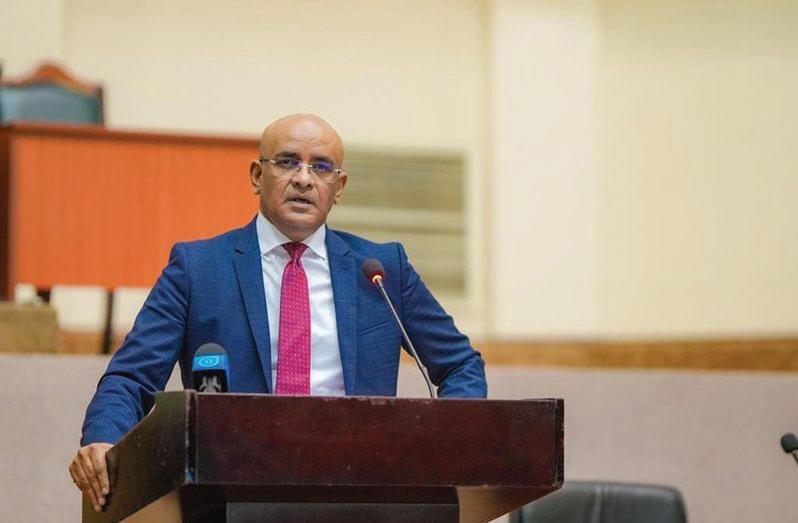
oil-and-gas production.
However, according to Dr Jagdeo, this sort of rhetoric is never put towards developed countries that have been harming the environment with their production of fossil fuels.
Putting things into perspective on how Guyana has changed since the PPP government took office, Dr Jagdeo said that if one compares the environ -
mental permits under the previous administration versus the current one, they would see the magnitude of change.
He further said that there are many policies and measures that have been crafted by the PPP government to safeguard Guyana, such as the treatment of waste water and the passing of new legislations.
While highlighting the double standards, Dr Jagdeo said: “Stop the oil production,” “keep it in the ground,” “too much emissions will come,” but they don’t tell the developed world to do that...”
The PPP General Secretary affirmed that the development of Guyana’s oil resources is being done responsibly.
Repeating some of the
narratives that Guyana has to endure, the PPP General Secretary said the nation often hears that they have a moral obligation, hence, Guyana should not pursue the expansion of its oil resources.
“What about the moral obligation of the developed world that has the current concentration of greenhouse gases that [are] already driving climate change?” he questioned.
Even though there are some individuals who question the ability of the government when it comes to managing the oil resources, the PPP General Secretary said there is transparency.
“We’re managing them even better than most of the developed world because we have total transparency in the use of the resources; every cent has to be [approved] by the Parliament before it’s spent; we have provisions that mandate that the Minister of Finance has to in-
form the country,” he said.
Dr Jagdeo added: “So we’re very pleased with our stewardship and the strong measures that we have put in place to monitor the sector... but we are not going to forego our opportunities.”
Although most Guyanese are standing in unison and saying that the nation has a right to develop its resources, Dr Jagdeo underscored that there are some persons who have other ambitions and choose to rally against this progress.
“We don’t take [kindly] to the lectures because we’re confident that these resources belong to our people and first of all, we’re elected to work for our people but we’re also mindful of our international obligations, [but] you have a group of people in this country who are hell-bent on pulling everything,” he firmly remarked.
BLACK Bush Polder, Region Six residents are bidding farewell to the era of mud dams, as the community underwent a remarkable transformation with the construction of concrete road networks.
Welcoming the new development, the residents shared that the upgrades have brought immense relief, as they no longer have to contend with the challenges posed by the previous unpaved roads.
Longtime resident, Camache Leonard, expressed her joy and relief for the new infrastructure. Speaking with the Department of Public Information (DPI) recently, Leonard recalled the difficulties of navigating the muddy paths for decades.
“For 50 years we lived with this dam very bad; we

punish from this road. When the whole place flood I had to walk with a stick and come out; fall, get up back. Now with the new road, we could go to the market and come home with the vehicle till to our house. I thank the government for making this nice road,” the 70-year-old resident shared.
Tina Harry underscored the impact the mud dam had on school-going children, particularly hers.
Nonetheless, she expressed her gratitude to the government for the new road, emphasising the benefits it brings to the entire community.
“Since the children used
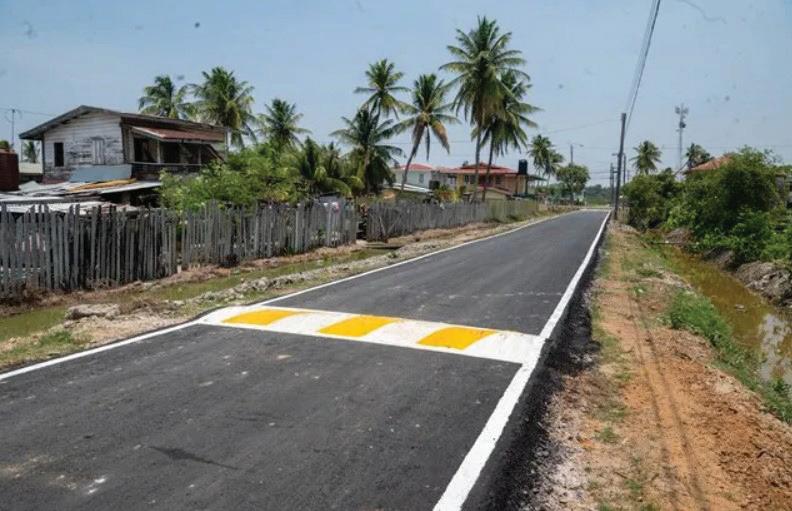
to go primary school, they go through mud till they go high school and now they get the road to go to high school and it’s a benefit for everyone,” Harry shared.
Vastie David shared similar sentiments while highlighting the improved accessibility for school children. She said, “The road is al-
right for the school children. It was hard when the rain fell, you didn’t want to come out. Now you get a smooth street to ride your motorbike.”
Basmattie Leonard also expressed gratitude and emphasised the difference it has made compared to the previous mud dam.
She recounted how her
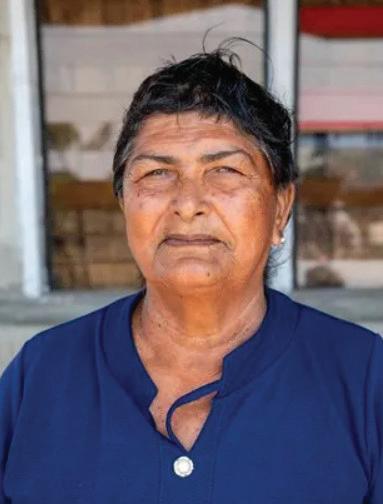
yard would often flood, causing damage to her garden and creating challenges for daily activities such as washing and cooking.
The massive overhaul of these 20 interior roads in Black Bush Polder is part of the Ministry of Public Works’ Miscellaneous Road Programme. (DPI)
 By Shaniya Harding
By Shaniya Harding
THE warm tropical sun complemented the bright smiles of children this Easter. Thousands gathered across Guyana to raise their kites in unison. The ‘Botanical Gardens’, the National Park, and ‘the seawalls’ were popular spots for families seeking to reconnect with each other, as well as with their heritage. There are a few elements that define Easter in Guyana: The ever-popular Hot Cross Buns, colourful handmade kites, and opportunity to spend time with family, all contributing to an authentic Guyanese Easter. From families who see the occasion as a time to strengthen bonds, to those who observe its significance, and those for whom the day is part of our identity, Easter holds varied meanings for everyone. Yet, above all, it is undeniably a Guyanese celebration, one where our unity and heritage shine brightly and soar high.
What springs to mind when thinking of Easter?
Is it the two-week holiday eagerly anticipated by children, the gatherings and food cherished by others, or the memories of Easters past? For 78-year-old Norma Trotman, Easter is a time for reminiscence. Born and raised in Soesdyke, East Bank Demerara, Norma experienced what many would call 'an old-time Easter'. For her, as it is today, Easter was among the most anxiously awaited occasions of the year, especially for children. Ms. Trotman recalled that games such as hopscotch, football, and rounders were integral to the celebration. This year, she and her family found themselves at the Kingston seawall.
This marks one of the many Easters Ms. Trotman has spent back in Guyana. Although Guyanese by birth, Ms. Trotman spent many years abroad, and asserts that there is nothing quite like a Guyanese Easter. “I came here twice to fly kite. I live overseas; in

the States. It's always beautiful; I always enjoy it. That's why I came back to fly my kite, because, in the States, you hardly ever fly kites.” Nowhere is the spirit of Easter stronger than in Guyana.
According to Ms. Trotman, Easter in Guyana is unique. She noted that while Easter is celebrated abroad, it doesn’t hold the same significance as it does here in Guyana.
One of the things that made Easter special back in the day for Ms. Trotman's was the food. Guyanese have always placed great emphasis on food. For us, it is a way of showing love and expressing our identity. As Ms. Trotman puts it, “The food was delightful; cross buns, vermicelli with currants in it, coconut milk. Coming back to Guyana, it brings back memories of my childhood days. So, I bring my daughter so she can experience it too.” Amid the celebrations and the vibrant atmosphere of the holiday, Ms. Trotman recalls what the holiday truly means to her: “Well, it's the resurrection of Jesus,” she said. “So, we

came here to go to church, because in many churches overseas, they hardly celebrate it, or they do so in a different way. So I came back to experience the original way Guyana celebrates it.”
The ‘Botanical Gardens’ is one of Guyana's premier recreational spots, and becomes particularly lively during the Easter weekend. Dozens of families gather in the gardens, under trees and in tents, as hundreds of children attempt to fly their kites. Among these families were the Lees, who came out along with their neighbours, the Ramroops. Kimison Lee, the patriarch of the Lee family, expressed a sentiment many fathers share: Easter is more than flying kites; it's a time for families to come together.
Working at a demanding job with long hours, Kimison finds it challenging to maker time for family. “I work for the government, so I don't really have much time to spend with them. And Easter is all about the
children.” Easter shines during childhood, with the break from school and the holiday's excitement. But as much as Easter is about the youngsters, Kimison explained that it's also a time for adults.
“Yes, Easter is for the children,” he said, “but I came out, too, to spend time with them, and to fly kites with them.” For parents everywhere, Easter presents an opportunity to create lasting memories.
Amid the celebration and excitement of Easter, it's important to remember the holiday's significance. That's how Akilah Williams feels. The 22-yearold and her two siblings made their way to ‘the Gardens’ from Linden. The family continues to honour Easter while keeping its significance at heart. Growing up in Linden, Akilah recalls Easter being a major event; one for which one prepared days in advance. “Even before Easter began, you could see a lot of kites in the air; hear Gospel music playing, and feel a general sense of anticipation.”
Akilah and her family use this time for reflection. She explained that they treat it as a regular holiday, allowing the children to enjoy themselves while also understanding Easter's biblical meaning. “We celebrate it as a normal holiday,” she said. “We bring out the children because we want them to experience it; we don't want them to feel left out.” Reflecting on Easter over the years, Akilah acknowledges that Easter means something different to everyone. Her message to Guyanese this Easter is simple: “Observe the holiday, regardless of how you interpret it.”
As long as kites continue to rise into the sky, and people flock to ‘the seawalls’, Easter will remain a vibrant tradition in the heart of every Guyanese. Whether the holiday is a time for family, fun, or religious observance, one fact remains: Easter in Guyana is unlike any other. So, Happy Easter to Guyanese everywhere, whatever the holiday means to you!






ST JOHN’S, Antigua, (CMC) – Guyana and Barbados produced contrasting performances but both remained unbeaten in the West Indies Under-15 Championship here Easter Monday.
Playing at Bethesda Sports Ground, Guyana thrashed Windward Islands by 91 runs while Barbados were forced to fight back before completing a four-wicket win over Jamaica at Coolidge Cricket Ground.
In the other game at Liberta Sports Club, Trinidad and Tobago defeated Leeward Islands by three wickets to notch their first win following defeats to Guyana and Barbados in the previous round.
Guyana were impressive after being sent in, piling up 251 for six off their 50 overs with Adri-
From page 24
venting her from finishing the race.
In the Under-20 Girls 100m hurdles, Habiba Harris led the charge for Jamaica, crossing the finish line in 12.93 seconds, which would have been a new championship record had it not been
08:45

an Hetmyer top-scoring with 52 off 58 deliveries with three fours and two sixes.
Shamar Apple chipped in with an unbeaten 43 off 46 deliveries with two fours and a six while Khush Seegobin (35) and Parmeshwar Ram (30) produced supporting knocks.
Leg-spinner Aravinda Bishop was the leading bowler with three for 35.
In reply, off-spinners Richard Ramdehol (3-7) and Ravaldo Pereira (335) claimed three wickets apiece to send Windwards crashing for 160 all out in the 40th over.
Opener Earsinho Fontaine top-scored with 35 off 64 deliveries with five fours while Khavaugh Bartholomew chipped in with 29 but the Windwards proved well short with their batting effort.
Barbados, though,
for a trailing wind of 2.4m/s. Her compatriot Briana Campbell secured the silver medal with a time of 13.11 seconds, while Sofia Swindell of the Virgin Islands (USA) claimed bronze in 13.95 seconds.
The Under-17 Boys 110m hurdles witnessed a fierce battle, with Jamaica's Michael Dwyer emerging victorious in 13.81 seconds.
endured some hiccups before disposing of Jamaica, restricting them to 168 for nine off their 50 overs after they were asked to bowl first.
Off-spinner Ramiro Stoute (3-33) and pacer Jayden Chase (3-36) spearheaded the attack for Barbados and Romareo Salmon was left to prop up the innings at number six with a top score of 48 off 67 balls with two fours and a six.
Barbados’ run chase began poorly when they slumped to 13 for two in the fourth over but Kelani Clarke (30) and Justin Parris (26) combined in a 57-run, third wicket stand to repair the damage.
However, once Parris pulled a long hop from leg-spinner Andrew Lloyd and holed out to deep mid-wicket, Barbados slumped again losing three wickets for three
Jahcario Wilson of Bahamas clocked 13.94 seconds to secure the silver medal, while Jamaica's Robert Miller followed closely behind in 13.97 seconds to claim bronze.
Shaquane Gordon continued Jamaica's dominance in the U20 Boys 110m hurdles, clocking an impressive time of 13.15
AMERICAN RACING TIPS
MAHONING VALLEY
Race 1 Big Falcon Rocket
Race 2 Montsuk.Cove
09:30 hrs
10:30 hrs
Race 3 Few Regrets
Race 4 Young Turk
Race 5 Watchoutforweaver
Race 6 Downtown Connector
runs to slip to 73 for five in the 14th over.
Kemar Dixon came to his side’s rescue, top-scoring with 43 not out off 97 balls with four fours, and anchoring a crucial 92-run sixth wicket partnership with Rajeev Parsooram whose 40 came from 74 balls and included three fours, to put his side on the brink of victory.
T&T, meanwhile, got half-centuries from Zane Maraj (69) and Zakariyya Mohammed (58) as they easily chased down a target of 216 with an over to spare.
Earlier, Lawshorn Bergan top-scored with an unbeaten 93 off 99 balls with seven fours and two sixes as the Leewards were dismissed for 215 off 48 overs.
seconds. Daniel Beckford of Jamaica claimed silver with a time of 13.25 seconds, while Curaçao's Lizheng Zhuang secured bronze in 13.94 seconds. Like Harris, Gordon was denied the championship record, as the wind was measured at 2.1m/s. (Sportsmax)
Race 7 Aunt Bee
SOUTH AFRICA RACING TIPS
KENILWORTH
08:15 hrs Pretty Precious
08:50 hrs Lickety Split
09:25 hrs Pacific Green
Today’s
(1)
(2)
LEBRON James secured a place alongside fellow great Michael Jordan in the NBA record books, as his 40-point haul helped the Los Angeles Lakers beat the Brooklyn Nets, 116-104.
James is only the second player, after Jordan, to score 40 points in more than one NBA game after the age of 39.
Jordan, who played until he was 40, achieved that feat three times, with James, 39, having now done it twice.
"Any time I'm linked

with the greats, it's pretty cool," James said.
D'Angelo Russell scored 18 to move beyond 10,000 career points, while James also matched a career high by registering nine three-pointers at Barclays Center, New York.
"I love this game. I try to put everything into the game and with it; it gives back to me," James said, adding:
"I just try to continually put my game where I have no weaknesses out on the floor, especially offensively.
Tonight, I had it going from the three-point line."
The Lakers are ninth in the Western Conference, and on track for a play-off berth with the Nets sitting 11th in the Eastern.
Elsewhere, the Oklahoma City Thunder clinched a play-off spot for the first time since 2020, with a 113-112 win against the New York Knicks.
Shai Gilgeous-Alexander tipped the game in Thunder's favour when he scored the winning point with just 2.6
seconds remaining.
The Denver Nuggets also ensured they will be involved in the season-ending playoffs after beating the Cleveland Cavaliers, 130-101.
Nikola Jokic, a two-time NBA Most Valuable Player, starred for the Nuggets, registering his 23rd triple-double of the season with 26 points, 18 rebounds and 16 assists.
"It speaks to why he's going to be a three-time MVP," Nuggets coach Michael Malone said.
"[It was] him showing up and saying, 'I'm going to do what MVPs do. I'm going to lead us to a win.'"
The Dallas Mavericks made it seven wins on the bounce, as Luka Doncic scored 47 points and matched his career-high of nine three-pointers in a 125107 victory at the Houston Rockets.
Doncic also added 12 rebounds and seven assists to bring an end to the Rockets' 11-game winning streak. (BBC Sport)
THE Board of Control for Cricket in India (BCCI) has called a meeting of the owners of the Indian Premier League (IPL) teams, scheduled to take place in Ahmedabad on April 16.
The Gujarat Titans will be facing the Delhi Capitals at the Narendra Modi Stadium in Motera concurrently.
Invitations have been extended to all ten owners of the IPL franchises. While it is anticipated that owners may be accompanied by
their CEOs and operational teams, the meeting, expected to address significant issues, is reportedly designated for owners only.
BCCI president Roger Binny, secretary Jay Shah, and IPL chairman Arun Singh Dhumal are slated to attend the meeting. The correspondence regarding the meeting is believed to have been sent by Hemang Amin, the CEO of the IPL.
Amin has not specified the agenda for the meeting,
but given the sudden nature of the invite, it is expected that the BCCI will address several policy decisions, primarily concerning the mega-auction scheduled for the following year. They will discuss the way forward for the IPL, said a source familiar with the matter.
Understandably, the number of retentions before the auction will be a focal point of discussion. This topic has divided the IPL ecosystem, with different owners hold-
ing varying views. There is no apparent consensus on the number, and the BCCI is believed to be seeking to negotiate a solution.
A section of the IPL owners believes that the number of retentions should be increased, arguing that teams have established themselves sufficiently and require continuity to bolster their brand and fan base. In fact, some suggest that the number of retentions should be as high as eight. However, another
group is opposed to such high numerous retentions and prefers a smaller number.
Additionally, there is discussion about reintroducing the Right to Match card, a mechanism used previously but absent at the last mega-auction in 2022. At that time, only four were permitted, with a maximum of three Indians or two foreigners.
Another prominent point of discussion will be the salary cap, a subject that always elicits differing opinions
among various segments of the IPL setup, with the BCCI itself having a strong view.
During the last mini-auction, the cap was set at INR 100 crore, but it is expected to go up, considering the huge uplift in the teams central revenue share following the BCCI’s signing of a staggering INR 48,390 crore broadcast deal two years ago. (Cricbuzz)
TRENT Boult, Yuzvendra Chahal and Riyan Parag extended Rajasthan Royals' winning run, and in the process sullied Mumbai Indians' quest for their first points of the season. MI marked their first home game of IPL 2024 with a humbling defeat, triggered by a batting collapse and a lowly total of 125 for NINE, which RR chased down with 4.3 overs and six wickets to spare.
The New Zealand pacer did what he does best - picking a wicket in the first over of the innings. He, went a step further to pick two as he had Rohit Sharma caught behind, and then trapped Naman Dhir leg before. With that, he took his tally of firstover wickets in the IPL to 25. The enormity of this feat is established by the fact that no other bowler has picked more than eight.
MI straightaway used their impact substitute to bring on Dewald Brevis for Dhir, in the hope of arresting the early, shocking slide. That, however, didn't pan out

as the South African became the third batter to be out for a duck - outside edging a length ball to Nandre Burger at short third.
Burger didn't stop at being just an ally to picking wickets as he joined in on the fun to send Ishan Kishan packing with a perfect length ball. The left-hander tried to
push at it but couldn't middle it and ended up nicking it behind to Sanju Samson.
Hardik walked out to bat in the fourth over and slapped a couple of fours off Burger in the sixth. 29 runs came in the three overs after the PowerPlay, with 18 off them coming from the MI skipper in just 10 balls. Hardik fell
to Yuzvendra Chahal when he mistimed a big hit to long on, falling for 34 off 21, 24 of which came in boundaries. Shimron Hetmyer flew to his right at backward point to send Piyush Chawla back in the 12th over. Tilak Varma, who was leading a lone fight, went after a ball outside the off-stump from Chahal and
cut it to Ashwin at short third. Chahal continued to float the ball up repeatedly and found success as Gerald Coetzee became his third victim of the game, hitting one straight to Hetmyer at cover. Chahal finished with figures of 3 for 11, including 16 dot balls and just one four.
Avesh Khan and Burger conceded just three runs off the 18th and 19th over, before Jasprit Bumrah put away a short ball in the final over to push MI just past 120.
MI's 17-year-old fast bowler Kwena Maphaka got his first wicket - of Yashasvi Jaiswal in the opening over. With so little to defend, Pandya used his ace Jasprit Bumrah for half the overs in the PowerPlay, but the RR duo of Sanju Samson and Jos Buttler just about escaped unscathed. Akash Madhwal though, did the damage on either side of the PowerPlay. He first had Samson playing one on and then Buttler top-edging a short ball to Chawla at fine leg. At 48/3, the game felt well and truly alive.
Not quite. Riyan Parag,
RR's most recent batting constant, brought his calmness and confidence to the middle and steered his side out of the early chaos. He started by upper-cutting a short ball from Gerald Coetzee over the 'keeper, and then pulled another for consecutive fours. With the asking rate under six, he and the promoted R Ashwin didn't take any risks to push the scoring ahead.
They brought the equation down to 38 off 48 when Madhwal returned to pick his third of the night. A leading edge off Ashwin's bat ballooned up on the off-side where Tilak Varma got under it for a simple catch.
Parag however, carried on gnawing at the target smartly. He put away a full ball from Bumrah in his fourth over but played out the rest of it in the company of impact substitute and debutant Shubham Dubey. He then slog-swept Chawla for a six, before wrapping up the chase with 6, 6, 4 off Coetzee, finishing with an unbeaten 54 off 39 balls.
(Cricbuzz)
ASITHA Fernando put Bangladesh on the backfoot with a four-wicket haul, as the hosts collapsed to 178 all out on the third day in Chattogram. Sri Lanka themselves slipped to 102 for 6 with debutant Hasan Mahmud picking up four of those wickets. But the visitors' lead stands at a formidable 455 runs at stumps after they didn't enforce the follow-on on Bangladesh.
The Sri Lankan fast bowlers attacked in pairs and benefitted greatly from captain Dhananjaya de Silva's innovative field placings.
Vishwa Fernando, Lahiru Kumara and Prabath Jayasuriya took two wickets each as Bangladesh slipped from 96 for 1 to be bowled out in the next 35.5 overs.
It was also their fifth successive sub-200 score in Tests, as their batting crumbled on either side of the lunch break on the third day.
..Sri Lanka were quick to lose six in their second innings, but took their lead past 450

(Scores: Sri Lanka 531 and 102 for 6 (Mathews 39*, Madushka 34, Mahmud 4-52) lead Bangladesh 178 (Zakir 54, Asitha 4-34, Kumara 2-19) by 455 runs.
Bangladesh started the day confidently. For the first time in the series, two home batters - Zakir Hasan and nightwatcher Taijul Islam - looked in some control.
(CMC) – Results of matches played in the third round of the West Indies Under-15 Championship on Monday.
Scores:
At Bethesda Sports Ground: Guyana beat Windwards by 91 runs
GUYANA 251 for six off 50 overs (Adrian Hetmyer 52, Shamar Apple 43 not out, Khush Seegobin 35, Parmeshwar Ram 30; Aravinda Bishop 3-35)
WINDWARD ISLANDS 160 off 39.3 overs (Earsinho Fontaine 35; Richard Ramdehol 3-7, Ravaldo Pereira 3-35)
At Coolidge Cricket Ground: Barbados beat Jamaica by four wickets
JAMAICA 168 for nine off 50 overs (Romareo Salmon 48; Ramiro Stoute 3-33, Jayden Chase 3-36)
BARBADOS 169 for six off 42.1 overs (Kemar Dixon 43 not out, Rajeev Parsooram 40, Kelani Clarke 30; Andrew Lloyd 2-21)
At Liberta Sports Club: T&T beat Leewards by three wickets
LEEWARD ISLANDS 215 off 48 overs (Lawshorn Bergan 93 not out, Tayari Tonge 40; Aarion Mohammed 4-27)
TRINIDAD & TOBAGO 219 for seven off 49 overs (Zane Maraj 69, Zakariyya Mohammeed 58, Tariq Richards 43; Lawshorn Bergan 3-25)
Zakir, unbeaten overnight on 28, struck two confident fours in the first two overs. He reached his fourth Test fifty with a streaky four but looked mostly in control.
Sri Lanka had a few whiffs of a wicket but Zakir and Taijul kept them at bay for an hour and 19 minutes in the morning session. That changed spectacularly when
Vishwa burst an inswinger through Zakir sending the leg-stump for a cartwheel. Soon after, Prabath got Najmul Hossain Shanto to chip one to short midwicket.
Bangladesh lost a third wicket in three overs when the left-arm quick Vishwa got another of his fast in-duckers ripping through Taijul's defences. The nightwatcher, sent in at No. 3 on the second evening, resisted for an impressive 61 balls.
Sri Lanka continued the pressure after lunch when Asitha set up Shakib Al Hasan with a two-card trick. After bowling a series of short balls, he surprised the left-hander with a full ball that struck his front pad plumb. Shakib in his first Test innings in almost 12 months fell for 15.
Three balls later, Asitha removed Litton Das. The wicketkeeper-batter, under fire for his careless shot in Sylhet last week, struck
a nice cover drive before edging a straight, slightly wide delivery from Asitha. Kumara then got Shahadat Hossain to edge one to second slip.
Sri Lanka dropped two catches around this time, while Mominul Haque became the fourth Bangladeshi batter to reach 4,000 Test runs. The experienced lefthander batted confidently on the ground where he has seven Test centuries. But Asitha's yorker resulted in his lbw dismissal, for 33. Khaled Ahmed fell in Asitha's next over, another yorker, giving the fast bowler his fourth wicket of the innings.
The pacers' domination continued in Chattogram when Mahmud and Khaled rocked Sri Lanka with six wickets.
Dimuth Karunaratne and Kusal Mendis were cleaned up by Mahmud and Khaled respectively. Mahmud then
removed Nishan Madushka, Dinesh Chandimal and Dhananjaya in consecutive overs in his second spell.
Madushka struck one to extra cover while Shahadat Hossain finally caught one in the slips, removing Chandimal for 9. De Silva was caught behind for 1, as Mahmud was rewarded for his off-stump channel consistency.
Khaled rounded up the day with Kamindu Mendis' wicket, edging one behind the wicket for 9. Captain Shanto took the timely review which showed the edge. Bangladesh's fielders enjoyed the wickets; at one stage, five fielders from the slip cordon chased an edge to the boundary much to the tiny crowd's glee. The players walked off slightly happier than earlier in the day although they have a mountain to climb in the fourth innings. (Cricinfo)
GUYANA’s fairytale run on their inaugural outing at the Masters Indoor Hockey World Cup came to an end with their clinching a silver medal after losing the final in Nottingham, England to the host nation on Monday.
England recovered from a pool-round loss to Guyana, showing up to edge Guyana 5-4 to claim the Men’s Over45 title.
The final clash saw Devin Hooper giving the Guyanese the early lead with a field goal, which went unanswered in the first period of play.
However, the second period saw Andy Langlands converting two awarded penalty corners to overturn the advantage as the English led, 2-1, at the break.
Guyana’s Dwayne Scott turned up in a major way in the second half, with a hattrick of goals in the 31st,

35th and 36th minutes to put Guyana up 4-2. England Langlands hit another gear as he returned to register a penalty corner and field goal in the 37th and 38th minutes to level the scorers, 4-4.
On the final play of the match, Langlands managed to sneak in a field goal in the final minute of regulation time, as England tipped Guyana for the gold medal, winning narrowly, 5-4. Guyana settled for the silver medal, with Germany capturing bronze, after beating France, 8-2.
Earlier in the competition, Guyana upset France, 3-2, in the semis.
The KFC Elite League season 6 continued with pulsating action on Sunday at the Guyana Football Federation National Training Centre.
In the feature clash of the night, Slingerz continued their flawless run with a 4-1 axing of Western Tigers.
Prolific Tigers goal scorer Andrew Murray, delivered his lone goal in the 25th minute to put the West Coat side Slingerz on the back foot for a good part of the first half.
Slingerz Darren Niles who days ago returned from Golden Jaguars duty in Saudi Arabia, showed his quality as he tied it up in the 42th minute of play before the break with his goal coming in the 42nd minute, 1-1 the scores read at the break.
After the break, fellow
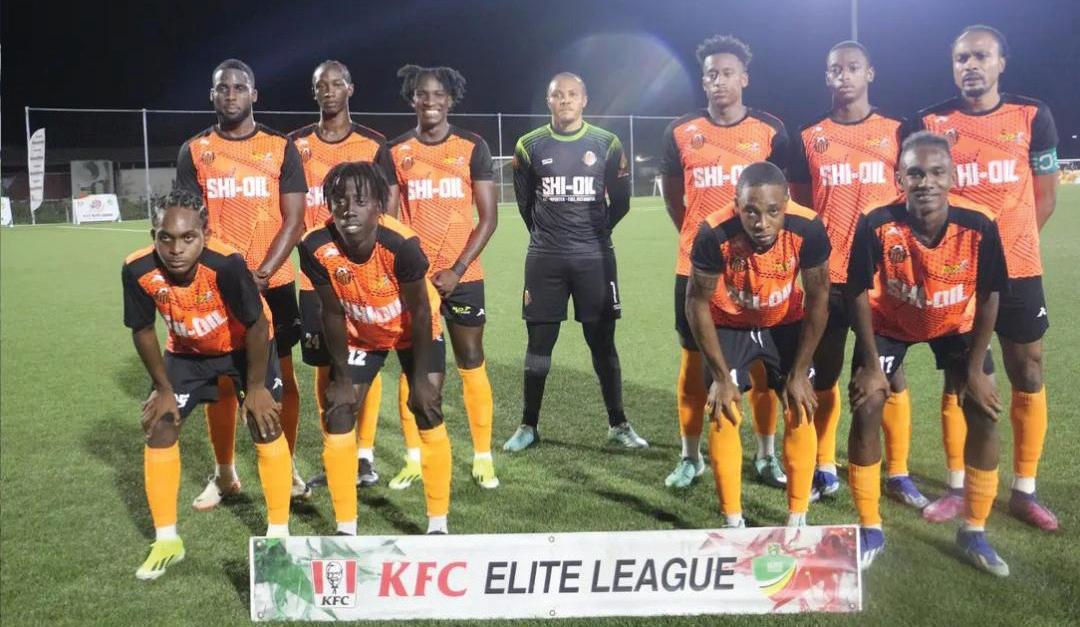
Golden Jaguar Sheldon Holder showed up to record a brace, which put Slingerz firmly in the driving seat with
his strikes in the 52nd and 56th minutes of the second half.
An 85th minute strike
from midfielder Curtez Kellman sealed the victory 4-1. Meanwhile, the opening contest saw carnage as reign-
ing and two-time champions
Guyana Defence Force were in imperious form when they
mance for the soldiers, as Olvis Mitchell kicked off the encounter in fine fashion with unanswered goals in the
Delroy Fraser and Chris Macey then followed suit in the 31st and 43rd minutes as they stormed Tucville based Fruta’s final third in the first Just before the break Mitchell again found the

back of the net to make it 5-nil before they came off
at half time to complete his hat-trick.
The second half saw GDF continuing with a dominant display as Ian Dooker and Stephen McDonald in the 64th and 72nd minutes extended the lead further 7-0.
Kelsey Benjamin then made a grand return to GDF outfit with his 89th minute goal to drive the final nail in the coffin for the 8-nil victory.
The 10-team league sees each side playing 18 games in total with 90 games scheduled before the league conclusion.
The teams are battling for bragging rights and 2 million dollars first place prize with 1.2 million for second place.

GUYANA’s champion horse for the year 2023, Spankhurst extended its dominance with another crushing win at the Port Mourant Turf Club Easter Cup. The Jumbo Jet-owned horse piloted by Jockey Colin Ross stormed to a G$ 2 million win in the feature race, finishing ahead of Stolen Money,
Jessica’s Pride and Cremore.
On a day filled with controversy where the stewards were hard at work, it was a dead heat for Stolen Money and Jessica’s Pride (who both was adjudged second) while Cremore came fourth in the feature race which was open to all horses, running at 1,700 meters.
The penultimate race of the day was the G & Lower and West Indies first time starters. It was a tense race as American Traveler won a sprint home to upset Soca Harmony.
However, after the race, the stewards disqualified American Traveler for interference at the first turn. Soca Harmony was
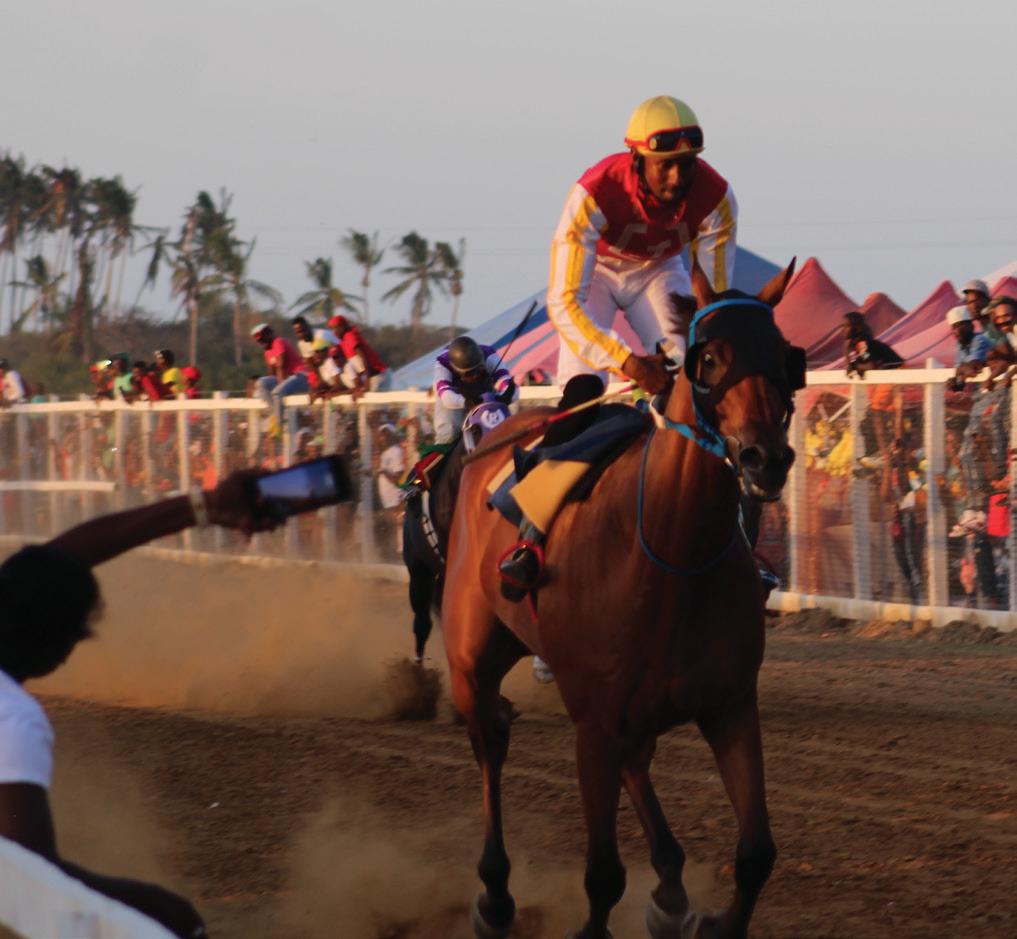
adjudged winner of the G & Lower and West Indies first time starters. Coup Detat came second. She WBO on Time came third while American Traveler was given fourth.
Earlier, the exciting race card started with Haley winning the J & Lower event. Tizway came second while Black Time and Shake the Bank rounded out the top four finishers in that order.
The second race of the day
was the E Class race which was won by Hecho Con Amor followed by Glorious Business and Phil in Echo in that order.
Race three was the L Open and J3 Maiden event. Top Gun, piloted by Jockey Kellman, cruised to victory, finishing ahead of Risk Affair. Princess Sasha finished third while Get Them Bobby finished fourth.
Star Fire Gold displayed dominance in the three-yearold Guyana-bred event. Jock -
ey Ronaldo Appadu piloted the Cheefoon-Racing Stables horse to the Scores Even trophy which was dominated by Dennis Deroop. In the three-year-old Guyana bred race, Country Rock came second while Regal Surprise and She’s a Monica were the top four finishers.
Eighteen-year-old jockey Kishan Pereira then script a sensational win in race five, the H and Lower race. He won with Jagdeo’s Racing Stable horse, Here Comes Heidi while Amicable Kate came second. Red Ruby and stable-mate Theory of Colors came third and fourth respectively.
This race was sponsored by Big G Lumber Yard, Kares Engineering, Ryan Tilak, Old Broom Lounge, K. Hanniff Construction, Kascon Construction, AJM Enterprise, Apsol, Money Tree Trading, T&R Construction, Port Mourant Turf Club, Jumbo Jet, KP Jagdeo, Wally Enterprise, Premium Asphalt, Zick Back Shop and Family, Archway Snackette, Devendra Bishoo and Dennis Deroop.
The next race day is set for April 28, the Jumbo Jet Thoroughbred Committee at Rising Sun Turf Club.

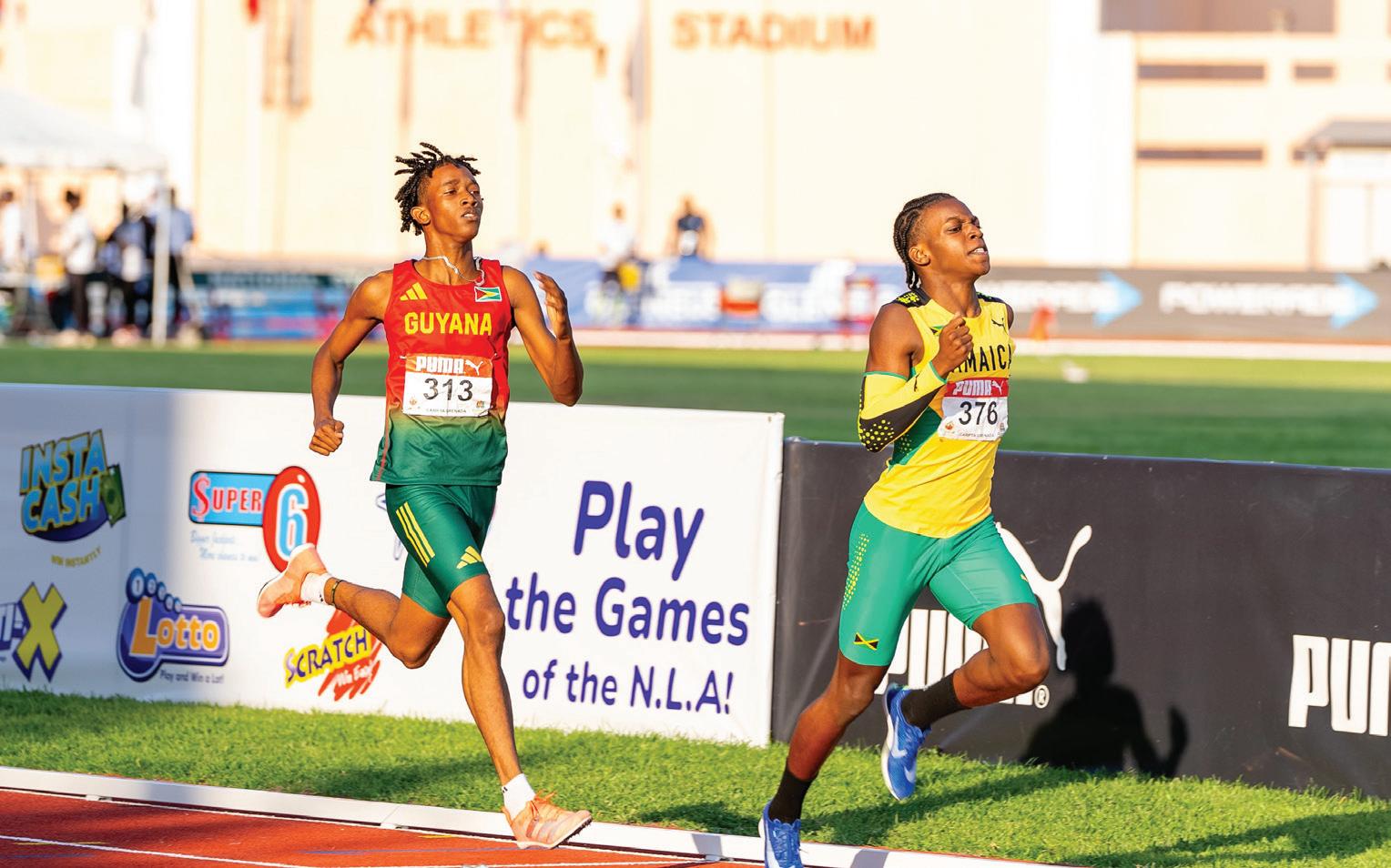
GUYANA won two more medals on the final day of the 51st CARIFTA Games in Grenada to take their tally to seven, four golds, two silvers, and one bronze.
Athaleyha Hinckson and Kaidon Persaud, at the Kirani James Athletics Stadium,
added to Guyana's haul on Sunday evening.
Hinckson could not complete her quest for a sprint double after finishing second in the U-17 200m final at the 51st CARIFTA Games in Grenada.
Jamaican Natrece East

held off the 100m gold medalist to clock 23.74s, followed by Hinckson (23.85s), and Antiguan Tyra Fenton, 23.97s.
U-20 400m Gold medalist Tianna Springer opted out of the 200m, due to a hamstring niggle.
Meanwhile, Persaud narrowly missed the top podium spot in the Boys U-17 800m final after a brilliant race, but lost the dramatic sprint finish to Jamaican Keandre Kelly (1:56.31s).
The Guyanese clocked 1:56.53s, while Jamaican
Bygrave and USVI’s Michelle Smith produced excellent performances to claim the respective Boys and Girls Under-20 800m titles on Day Three of the 51st CARIFTA Games at the Kirani James Stadium in Grenada on Monday.
Bygrave led from start to finish to win the Boys final in 1:51.43, and complete the 800m, 1500m double.
Grenada's Deangelo Brown was second in 1:52.81, while Trinidad & Tobago's Keeran Sriskandarajah was third, in 1:52.91.
In the Girls final, Smith
bided her time before producing a spirited final lap to take the title in 2:06.18, just outside of the record 2:05.90 set back in 2008 by Natoya Goule.
This gold medal also completes a double for Smith, as she took gold in the 400m hurdles on Sunday.
Haiti’s Victoria Guerrier ran 2:07.45 for silver, while Jamaica’s Monique Stewart took bronze in 2:07.56.
The Under-17 Boys final saw Jamaica’s Keandre Kelly produce a mature performance to win in 1:56.31.
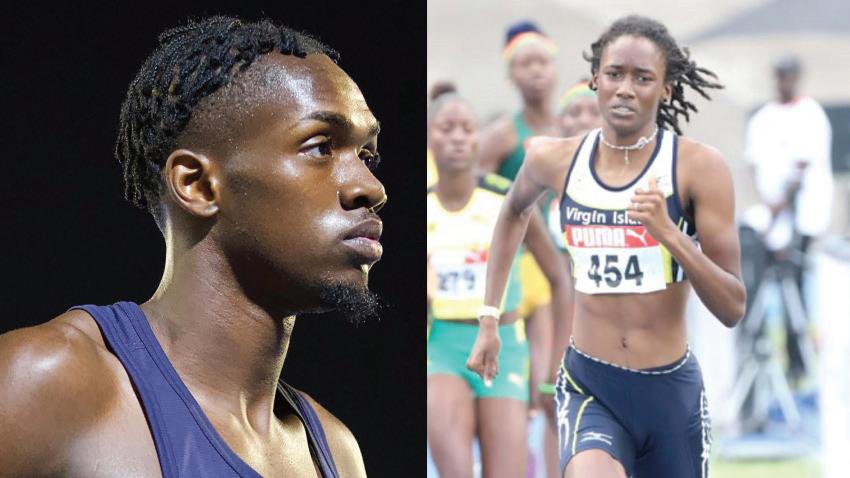
Alejandro Palmer (1:58.05s) was third. Persaud was Guyana's lone medalist in the 800m finals, as Alkila Blucher (fifth—2:24.29s) and Attoya Harvey (sixth—2:16.10s) did not make the top three in their races.
Up to press time, Guyana had yet to compete in the U-20 4x400m relays.
At the previous Games, Guyana won eight medals—three golds, two silvers, and three bronzes.
— on final day of 2024 CARIFTA Games
tailwinds exceeding the allowable limit.
Guyana’s Kaidon Persaud ran 1:56.53 for silver, and Kelly’s teammate Alejandro Palmer ran 1:58.05 to take bronze.
Jamaica secured gold and silver in the Under-17 Girls final, through Kevongaye Fowler and Alikay Reynolds.
Fowler took gold in 2:16.97, while Reynolds, as she did in the 1500m, had to settle for silver in 2:17.02.
Grenada’s Annalisa Brown ran 2:18.75 for bronze. (Sportsmax)
JAMAICA put on show its incredible depth in the sprint hurdles, clinching four gold medals amidst a whirlwind of excitement and drama at the Kirani James Stadium in Grenada on Monday’s final session of the 51st CARIFTA Games.
The evening session kicked off with Jamaica dominating the sprint relays, but two potential championship records were dashed due to strong
In the Under-17 Girls 100m hurdles, Malayia Duncan blazed to victory with a time of 13.63 seconds, followed closely by Trinidad and Tobago's Jenna-Marie Thomas (13.74s), and Curaçao's Zsa-Zsa Frans (14.21s). However, Jamaica's Angel Robinson faced disappointment after a mishap at the first hurdle, pre -
Continued on page 20